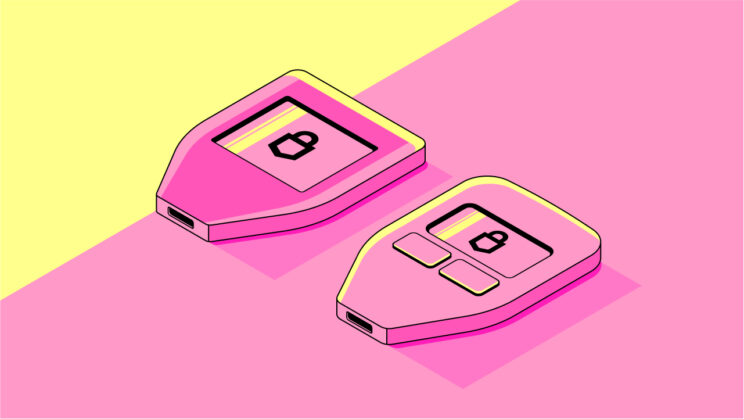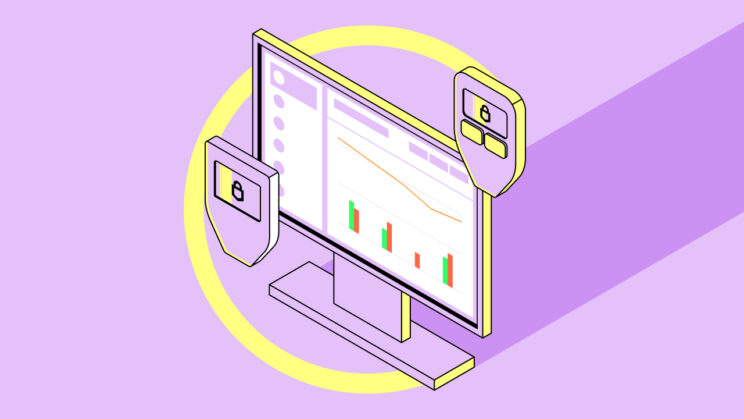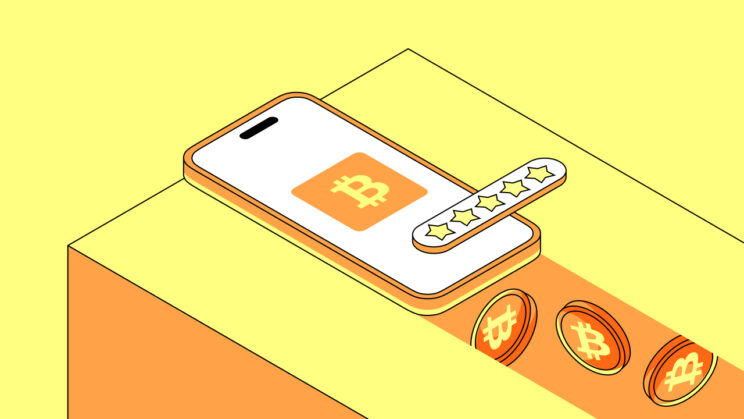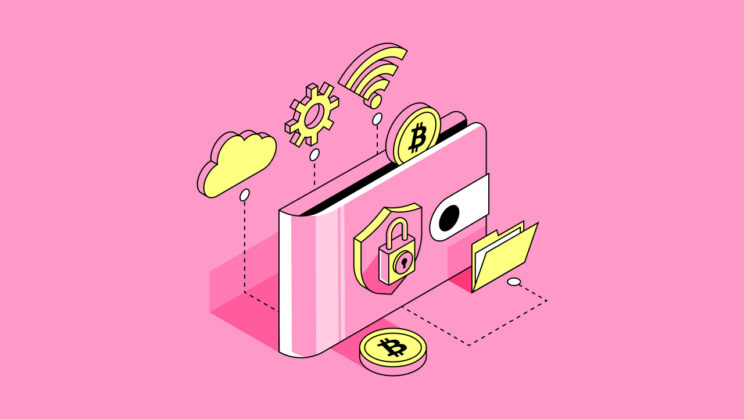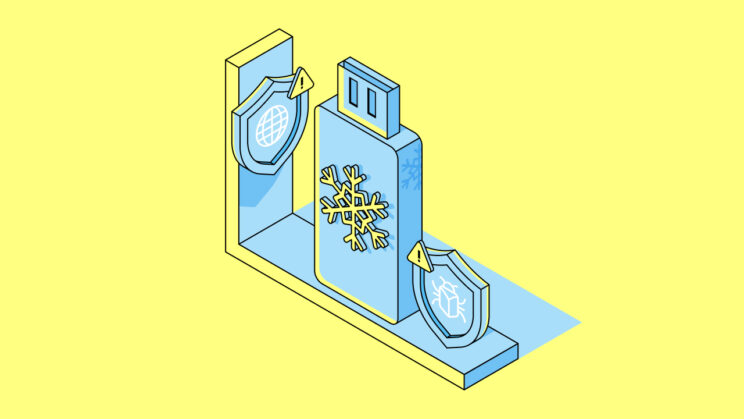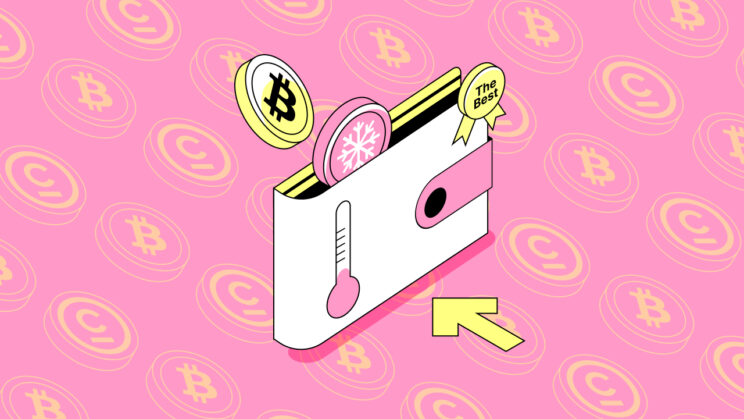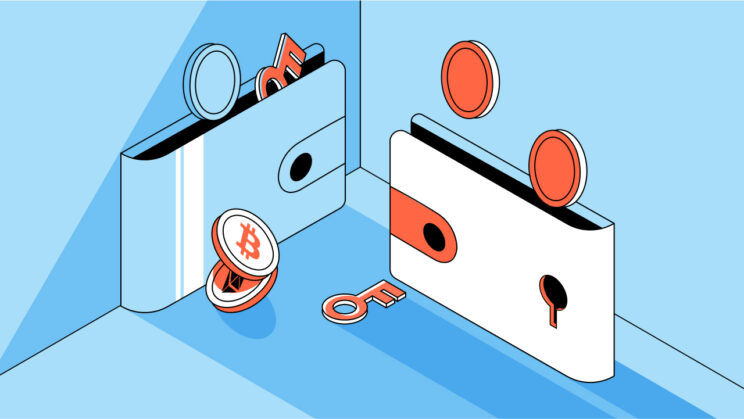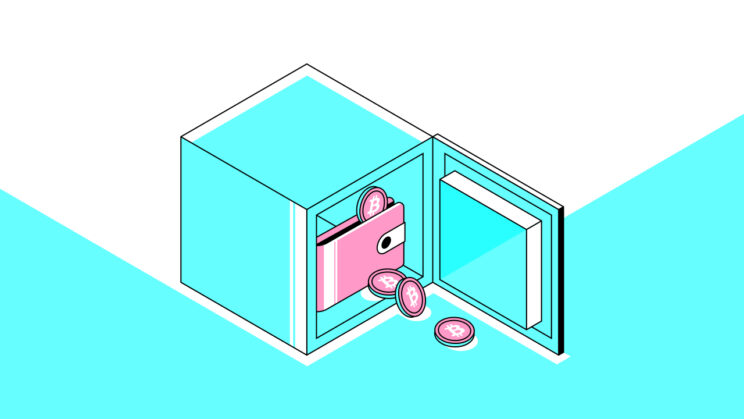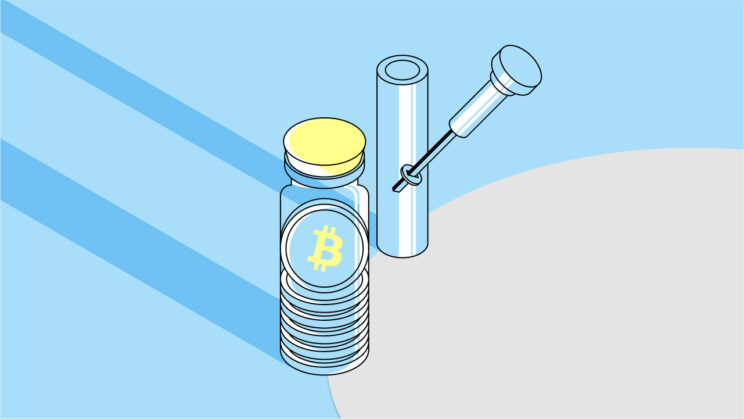12 Best Crypto Wallets in January 2024
Cryptocurrency wallets come in different types, from online wallets accessible through a web browser to hardware devices designed to store cryptocurrencies offline.
In today’s digital world, where the Internet and technology have become part of our lives, cryptocurrencies have taken a special place. Cryptocurrencies are digital assets based on cryptographic principles. They allow users to make secure and anonymous financial transactions over the Internet.
Top Crypto Wallets of January 2024 in Different Categories
- Cropty Wallet: Best crypto wallet for beginners
- Ledger Nano X: Most secure crypto wallet
- Trezor Model T: Best hardware crypto wallet
- Blockchain.com Wallet: Best online (web) crypto wallet
- Trust Wallet: Best crypto wallet for mobile devices
- Metamask wallet: Best wallet for Ethereum
- Guarda Wallet: Best desktop crypto wallet
- CryptoSteel Capsule: Best metal wallet for seed phrase storage
The best mobile crypto wallets of January 2024
There are many mobile cryptocurrency wallets on the market in 2023, each with its own benefits and features. This is one of the most popular ways to store and use cryptocurrencies.
Cropty Wallet: Best for Beginners

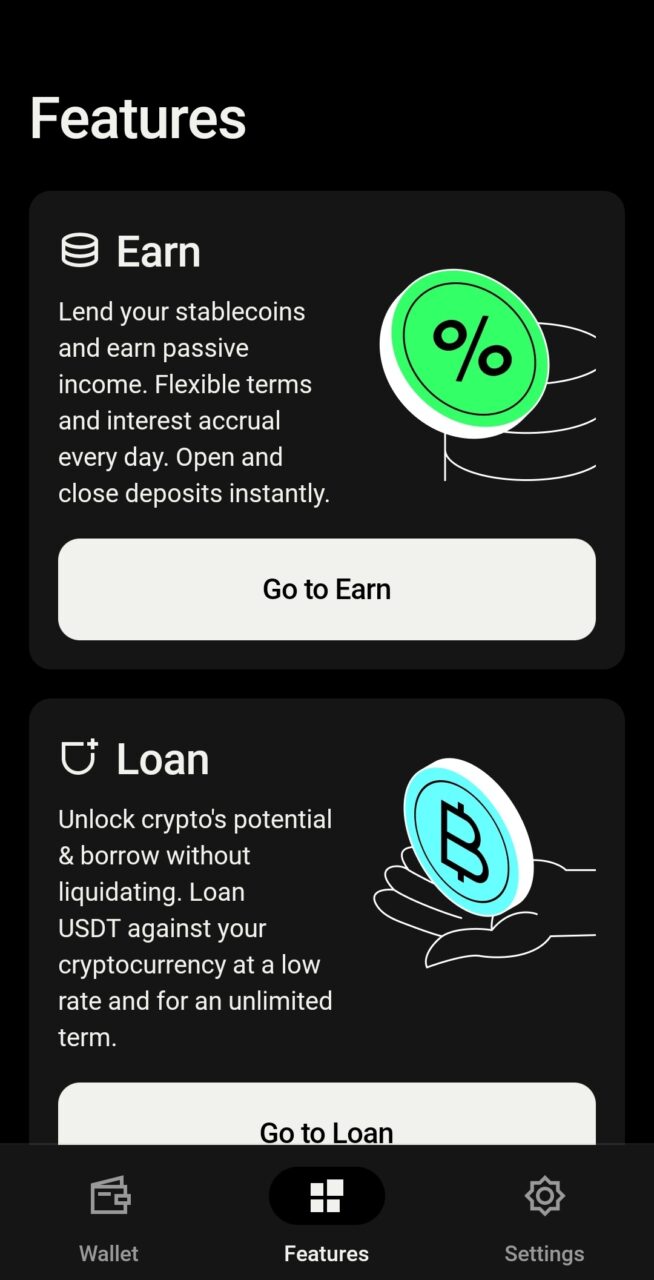
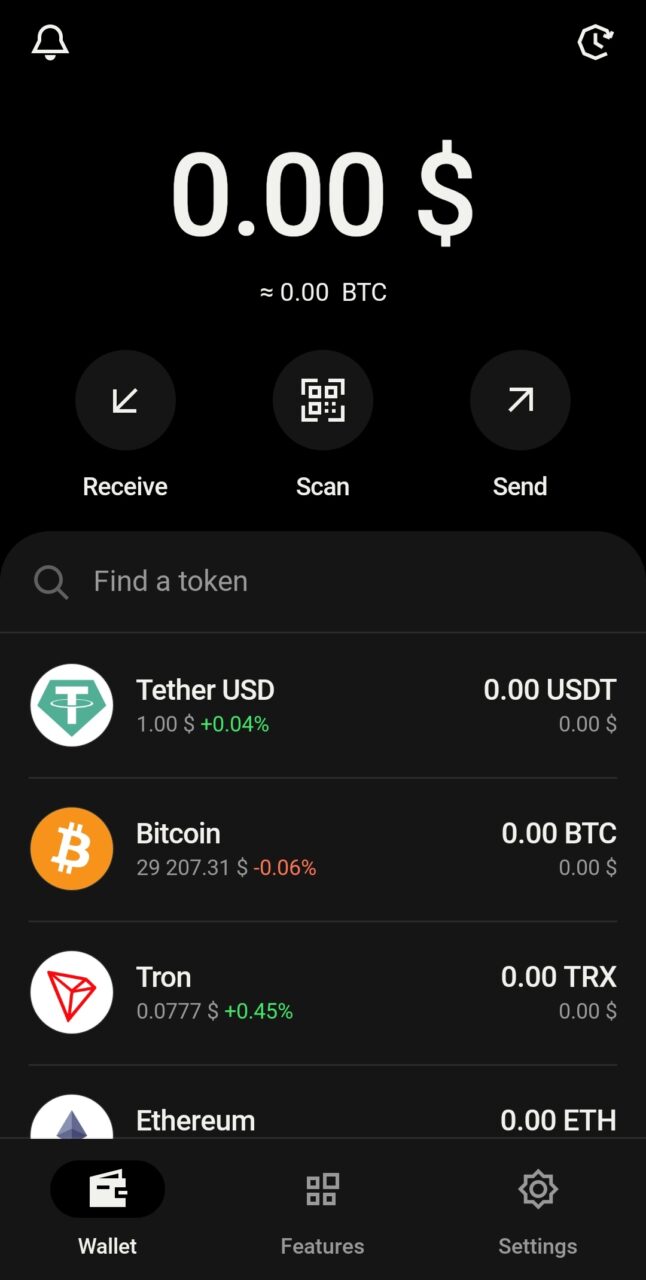
Pros of Cropty Wallet:
- User-friendly and intuitive interface: Cropty provides an easy-to-use interface suitable for both experienced crypto traders and beginners.
- Instant approval and easy access to loans: Cropty offers quick and easy access to loans without the need for credit checks, providing a flexible payment option.
- Secure custody and storage: The wallet ensures the safety of digital assets through end-to-end encryption, protecting private keys from unauthorized access.
- Wide range of supported cryptocurrencies: Cropty supports over 40 cryptocurrencies, making it a versatile wallet for users with diverse digital assets.
- Multi-device synchronization: The wallet allows synchronization across multiple devices, enhancing accessibility and convenience.
- 24/7 customer support: Cropty offers continuous customer support, providing assistance whenever needed.
- Built-in crypto Academy: Users can expand their knowledge of cryptocurrencies and maximize their assets with the integrated crypto Academy.
Cons of Cropty Wallet:
- Custodial wallet: Being a custodial wallet means users do not have direct control over their private keys, which goes against the principle “not your keys, not your money.”
- Limited APR for earning: The Annual Percentage Rate (APR) for earning is relatively low and ranges from 1% to 6%, with flexible calculations.
- Limited cryptocurrency options for earning and loans: At the time of the review, the earning and loan features only support USDT, limiting users’ options.
- Potential conversion fees for earning and loans: Users may need to convert their cryptocurrencies to USDT to utilize the earning and loan functionalities, which could incur additional fees.
What makes it best:
Cropty Wallet is a custodial storage solution that prioritizes security, offering end-to-end encryption technology and professional custodians to safeguard user funds. With a user-friendly interface, it caters to both experienced traders and beginners. The wallet allows instant access to loans without credit checks, providing flexible repayment options.
Cropty Wallet stands out as an excellent choice for beginners due to its custodial nature, which mitigates the risks associated with user errors that can lead to the loss of assets. By entrusting the management of private keys to professional custodians, users can avoid the complexities and potential pitfalls of handling keys themselves. Moreover, Cropty offers a straightforward and user-friendly interface, making it exceptionally easy to navigate. Beginners can quickly grasp the functionalities and efficiently manage their digital assets without feeling overwhelmed by technical complexities.
To further support newcomers, Cropty provides comprehensive instructions and learning resources through its built-in crypto Academy. These educational materials empower users to gain a deeper understanding of cryptocurrencies and make informed decisions about their investments. Supporting over 40 cryptocurrencies, Cropty ensures users can manage all their digital assets in one place. Multi-device synchronization enables seamless access from desktop or mobile devices. The wallet also provides 24/7 customer support for prompt assistance.
3 standout features of the Cropty Wallet:
- Instant Access to Loans: Cropty Wallet offers a distinctive feature of providing users with instant access to loans. Users can secure loans using their digital assets as collateral, without the need for credit checks or lengthy approval processes. This feature provides quick liquidity to users, allowing them to access funds when needed, making it highly convenient.
- Crypto Investments from Just 10 USDT: Cropty Wallet stands out by enabling users to start their crypto investments with as little as 10 USDT value. This low entry barrier makes it attractive for both beginners and seasoned investors to participate in the crypto market without the need for significant capital.
- Unique Referral Program with Mutual Benefits: Cropty Wallet’s referral program offers a unique twist. Not only can users earn rewards by inviting friends to join the platform, but the people who use the referral also get to benefit. This mutual benefit approach encourages more people to participate and fosters a sense of community within the platform.
Trust Wallet: Best for Mobile Users

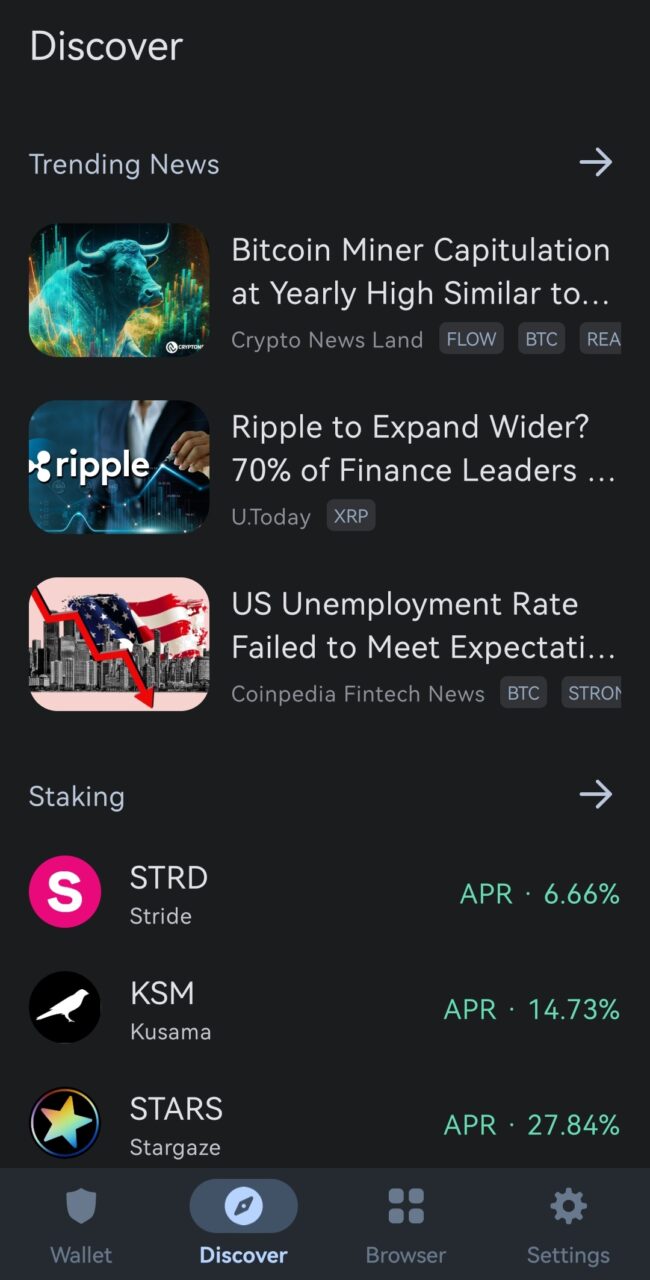
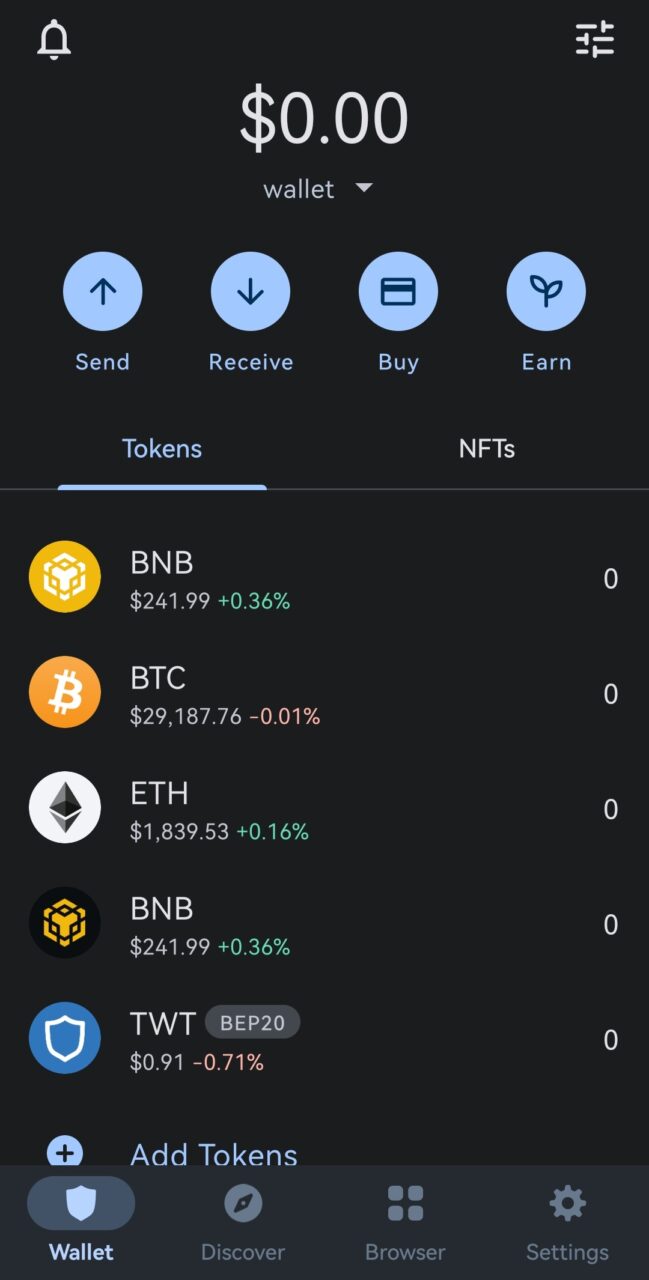
Pros of Trust Wallet:
- Secure Offline Mobile Wallet: Trust Wallet is a free software crypto wallet that allows users to securely store their cryptocurrencies offline on their mobile phones. By utilizing private keys stored on the device, it mitigates the risk of cyber theft compared to exchange wallets.
- User-Friendly Interface: Trust Wallet offers an easy-to-use interface, making it suitable for both beginners and experienced users. Navigating through its features, such as sending, receiving, and buying crypto, is straightforward and intuitive.
- Comprehensive Instructions and Learning Resources: Trust Wallet provides users with detailed instructions on setting up the wallet, including the importance of securing the recovery phrase. Additionally, its built-in browser feature enables secure interaction with decentralized applications (DApps), expanding users’ crypto experience.
Cons of Trust Wallet:
- Third-Party Transaction Providers: Trust Wallet relies on third-party providers, like Moonpay, for transactions. However, some banks may decline cryptocurrency purchases using cards, limiting the ease of buying crypto directly through the app.
- Limited Token Swapping and Exchanging: Not all tokens are available for swapping or exchanging within Trust Wallet. The majority of options are based on the Binance Smart Chain, which may restrict certain transactions.
- Offline Security Risks: While Trust Wallet offers security against cyber theft, it still faces the risk of physical theft. As the wallet ties to the user’s specific device, losing or damaging the device could result in losing access to the wallet and its contents.
What makes it best:
Trust Wallet is the perfect cryptocurrency wallet for mobile users, offering a host of compelling features that set it apart from others in the market. Its primary strength lies in providing unparalleled security for your digital assets. Unlike exchange wallets, Trust Wallet allows you to maintain complete control of your private keys directly on your mobile device, significantly reducing the risk of cyber theft. It generates a 12-word recovery phrase during setup, ensuring that you can regain access to your wallet in case your phone is lost or damaged.
The user-friendly interface of Trust Wallet makes it suitable for both beginners and experienced crypto enthusiasts. From sending and receiving cryptocurrencies to buying and exchanging tokens, the app offers a hassle-free experience, empowering you to manage your digital assets seamlessly on the go.
Trust Wallet’s extensive token support is another highlight. It accommodates a wide range of cryptocurrencies and tokens, including popular ones like Bitcoin, Ethereum, and Binance Coin, as well as various ERC-20 and BEP-20 tokens. This versatility allows you to store and manage all your diverse assets within a single wallet.
The built-in browser feature of Trust Wallet enables you to interact with decentralized applications (DApps) directly from the app. This opens up a world of possibilities, granting you access to DeFi platforms, NFT marketplaces, and other innovative blockchain services without leaving the wallet. Trust Wallet empowers you to explore the full potential of the crypto ecosystem without compromising on security.
The Trust Wallet team is dedicated to regular updates, ensuring that the app remains current with the latest industry standards and protocols. In case you encounter any issues, Trust Wallet’s customer support team is prompt and responsive, ready to assist you.
3 standout features of Trust Wallet:
- Offline Security and Private Key Control: Trust Wallet offers a unique level of security by allowing users to store their private keys directly on their mobile devices. This offline storage approach reduces the risk of cyber theft, as hackers cannot remotely access the keys. Users have full control over their private keys, ensuring maximum security for their digital assets.
- Comprehensive Token Support: Trust Wallet stands out with its extensive token support, accommodating a wide range of cryptocurrencies and tokens. Users can store not only major cryptocurrencies like Bitcoin and Ethereum but also various ERC-20 and BEP-20 tokens. This versatility makes Trust Wallet a one-stop solution for managing diverse crypto portfolios.
- Built-in DApp Browser: Trust Wallet’s built-in browser feature allows seamless interaction with decentralized applications (DApps) directly from the wallet. Users can access DeFi platforms, NFT marketplaces, and other blockchain services without leaving the app. This integration expands the possibilities and utility of Trust Wallet, making it a powerful tool for exploring the decentralized ecosystem.
Metamask Wallet: Best for Ethereum

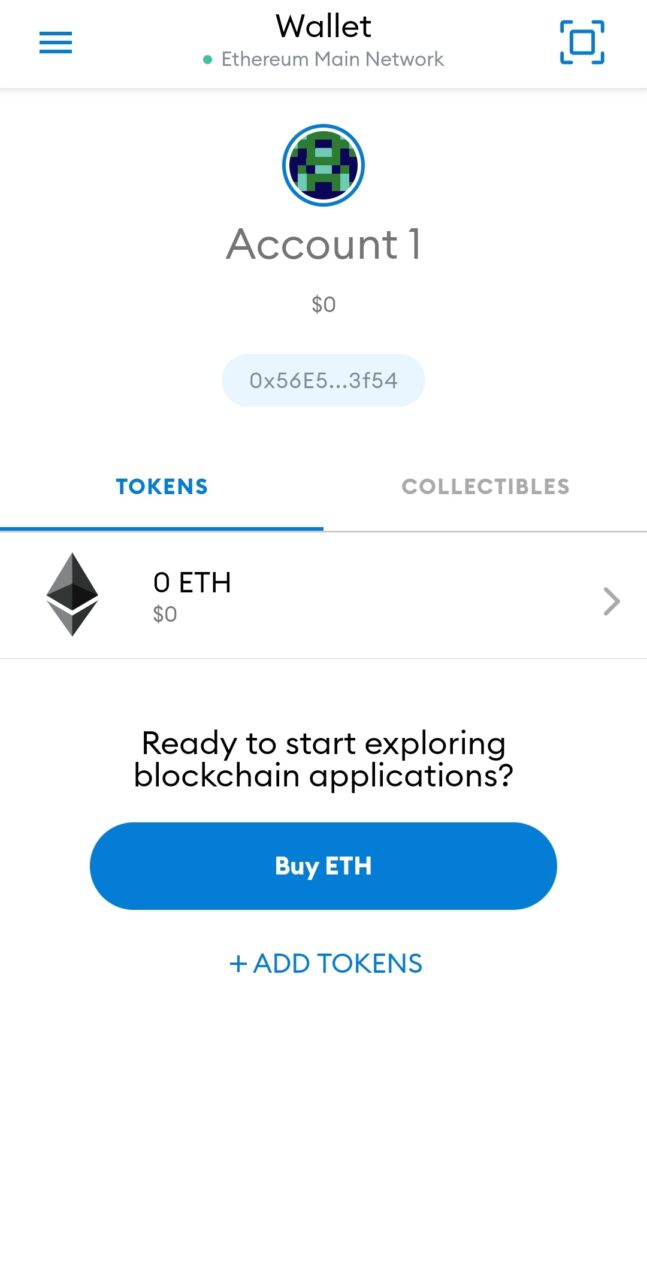
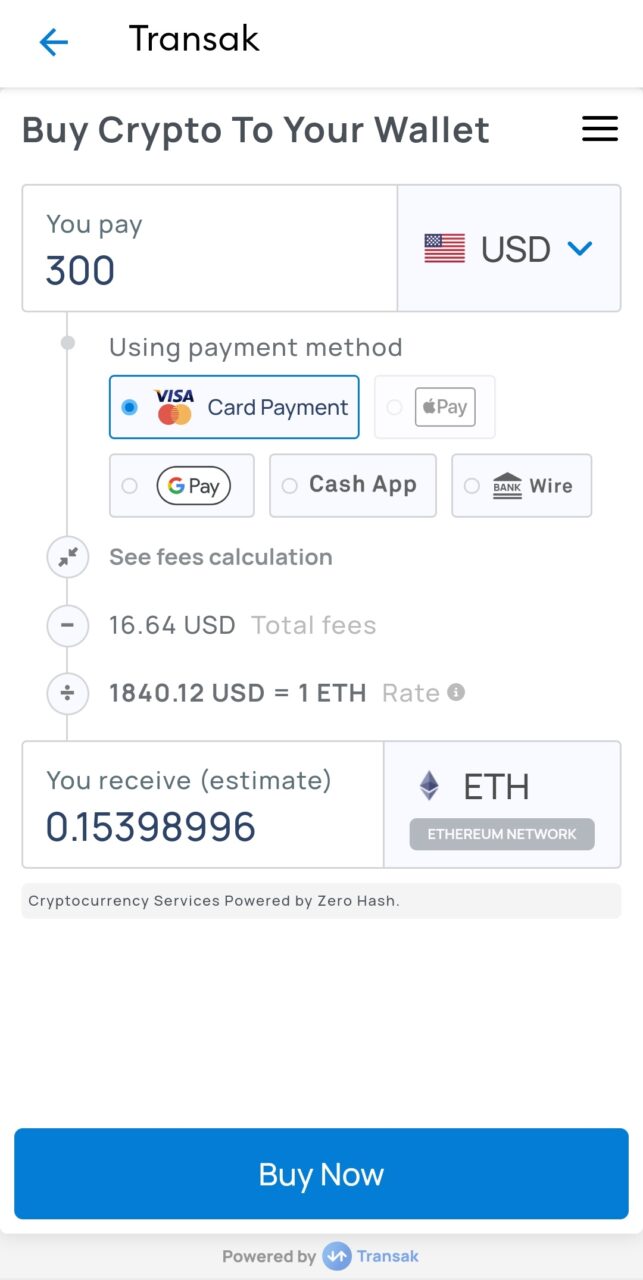
Pros of Metamask Wallet:
- Intuitive Interface Design: Metamask boasts an intuitive and user-friendly interface both on its browser extension and mobile app. This makes it easy for beginners and experienced users to navigate and manage their digital assets effectively.
- NFT Marketplace Compatibility: Metamask allows seamless integration with NFT marketplaces, enabling users to participate in the exciting world of non-fungible tokens and explore blockchain-based collectibles and art.
- Supports Extensive dApps: With support for thousands of decentralized applications (dApps), Metamask opens up a world of possibilities for users to interact with various DeFi platforms and other blockchain services directly from the wallet.
Cons of Metamask Wallet:
- High Fees for Buying Ether: One downside of using Metamask is that buying Ether (ETH) within the wallet can sometimes incur relatively high fees, especially during peak network congestion periods. This may not be ideal for users seeking cost-effective transactions.
- Limited Bitcoin Support: Unlike Trust Wallet, Metamask has a primary focus on the Ethereum network and its associated tokens. As a result, it does not offer direct support for storing Bitcoin (BTC) or other non-EVM-compatible cryptocurrencies. Users who primarily hold Bitcoin may find other wallets more suitable for their needs.
What Makes it best:
Metamask is a user-friendly and secure software wallet that simplifies interactions with blockchains. Its intuitive interface on both browser extension and mobile app makes managing digital assets effortless for users of all levels. The wallet’s ability to store multiple private keys and work seamlessly with various networks, particularly the Ethereum network and Binance Smart Chain, sets it apart as a versatile tool for the crypto community.
For Ethereum users, Metamask is a game-changer. It offers unparalleled support for Ethereum and its associated tokens, such as ERC-20 and ERC-721. Through the browser extension, users can seamlessly access and interact with a wide range of Ethereum-based decentralized applications (dApps). Metamask’s compatibility with Ethereum Virtual Machine (EVM) compatible networks, such as Polygon and Arbitrum, opens the door to a vibrant ecosystem of DeFi protocols and NFT marketplaces.
Additionally, Metamask’s low fees for token swaps and buying crypto directly within the extension provide a cost-effective way to participate in the Ethereum ecosystem. Its robust security measures, including local storage of private keys and constant audits, ensure users have complete control over their assets while maintaining peace of mind. Whether you’re a beginner navigating the crypto space or an experienced Ethereum enthusiast, Metamask’s support for Ethereum and its user-centric design make it an indispensable tool for interacting with the world’s leading smart contract platform.
3 standout features of Metamask Wallet:
- Intuitive Gateway to Blockchains Metamask serves as an intuitive gateway for users to effortlessly interact with various blockchains. By handling complex coding behind the scenes, it simplifies transactions, making it user-friendly, even for crypto newcomers.
- Robust Security Measures Metamask ensures the secure storage of private keys, crucial for accessing assets on the blockchain. With the ability to create multiple accounts and import existing wallets, users can conveniently manage assets across different networks. The option to generate and restore mnemonic seed phrases enhances wallet security and allows for easy recovery if needed.
- Unparalleled Support for Ethereum Metamask stands out with its exceptional support for the Ethereum blockchain. Users can seamlessly interact with a wide array of Ethereum-based dApps, including NFT marketplaces. Additionally, its compatibility with Ethereum Virtual Machine (EVM) compatible networks, like Polygon and Binance Smart Chain, expands possibilities for DeFi protocols and NFT ecosystems.
Here is a clear table of characteristics and features of the mentioned mobile (software) crypto wallets:
| Features | Trust Wallet | Cropty Wallet | Metamask Wallet |
| Description | Mobile app for cryptocurrency management | Mobile app for cryptocurrency management | Mobile application for managing Ethereum-based cryptocurrencies (ERC-20, ERC-721 and others), cryptocurrency wallet to work with DApps on Ethereum |
| Platforms | Web version (Google Chrome browser extension) and mobile platforms (Android and iOS) | Web platform (access to all wallet functions from the browser) and mobile platforms (Android and iOS) | Web version (Google Chrome browser extension) and mobile platforms (Android and iOS) |
| Keys control | Private keys are stored on the device | Private keys are not stored on the device | Private keys are stored on the device |
| Multicurrency | Support for a wide range of cryptocurrencies | Support for a wide range of cryptocurrencies | Support for Ethereum-based cryptocurrencies and tokens (ERC-20, ERC-721 and others) |
| Decentralized exchange | Ability to exchange cryptocurrencies directly in the app | Ability to exchange cryptocurrencies directly in the app | Ability to exchange cryptocurrencies directly in the app |
| Integration with DApps | Interoperability with decentralized applications | No | Ability to interact with DApps on Ethereum |
| Browser integration | Built-in Web Browser | A separate Web platform | Integration with Google Chrome extension |
| Security | Encryption, private keys on the device | Encryption, two-factor protection, private keys are not stored on devices, additional security measures | Keeping keys on the device, additional security measures |
| Additional Features | Passive income (staking), importing wallets, Dapp-browser | Passive income (staking), loans, affiliate program, donations, support service 24/7/365 | Account management, import/export of wallets |
The best hardware crypto wallets 2023
Ledger Nano X
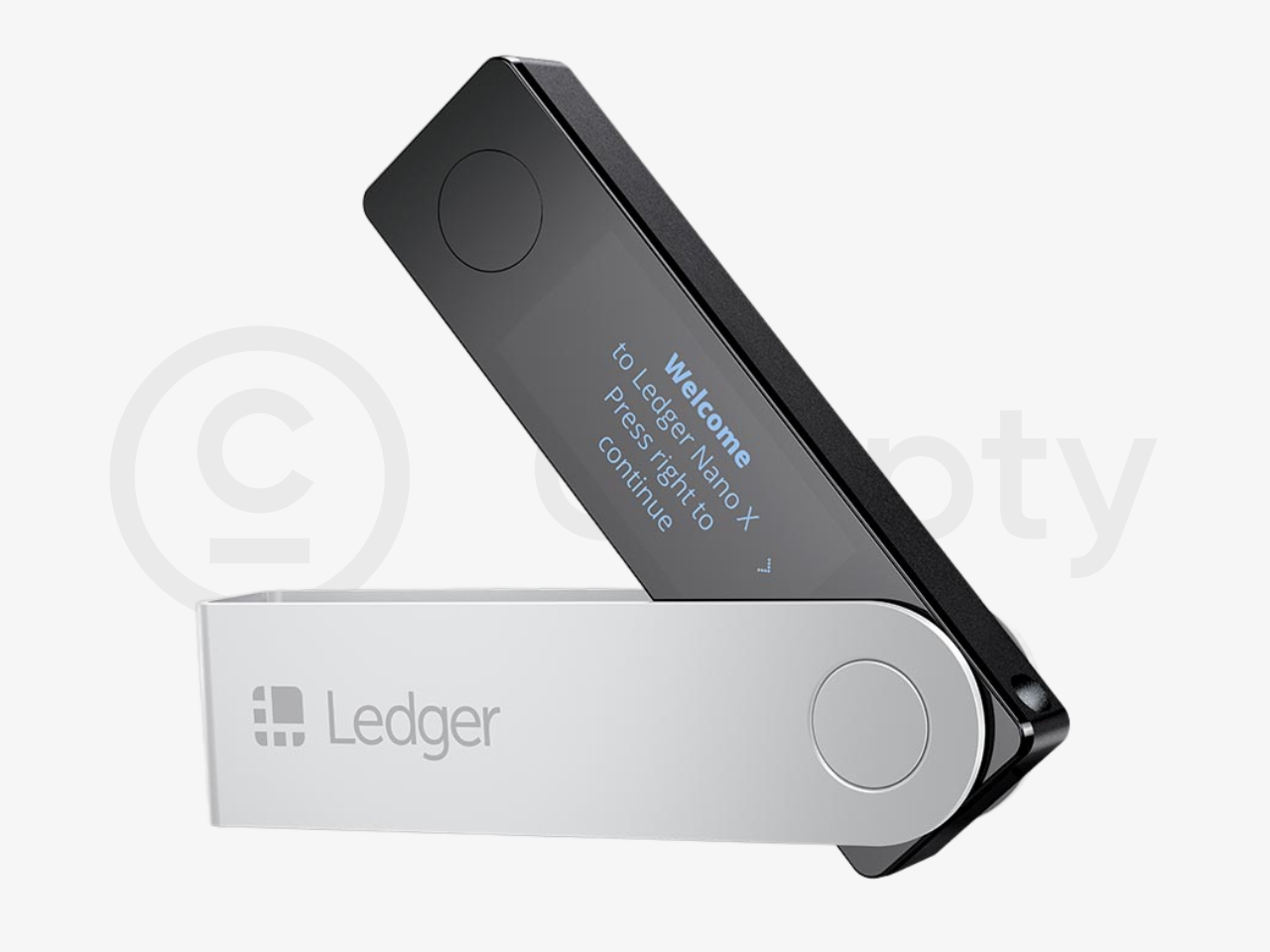
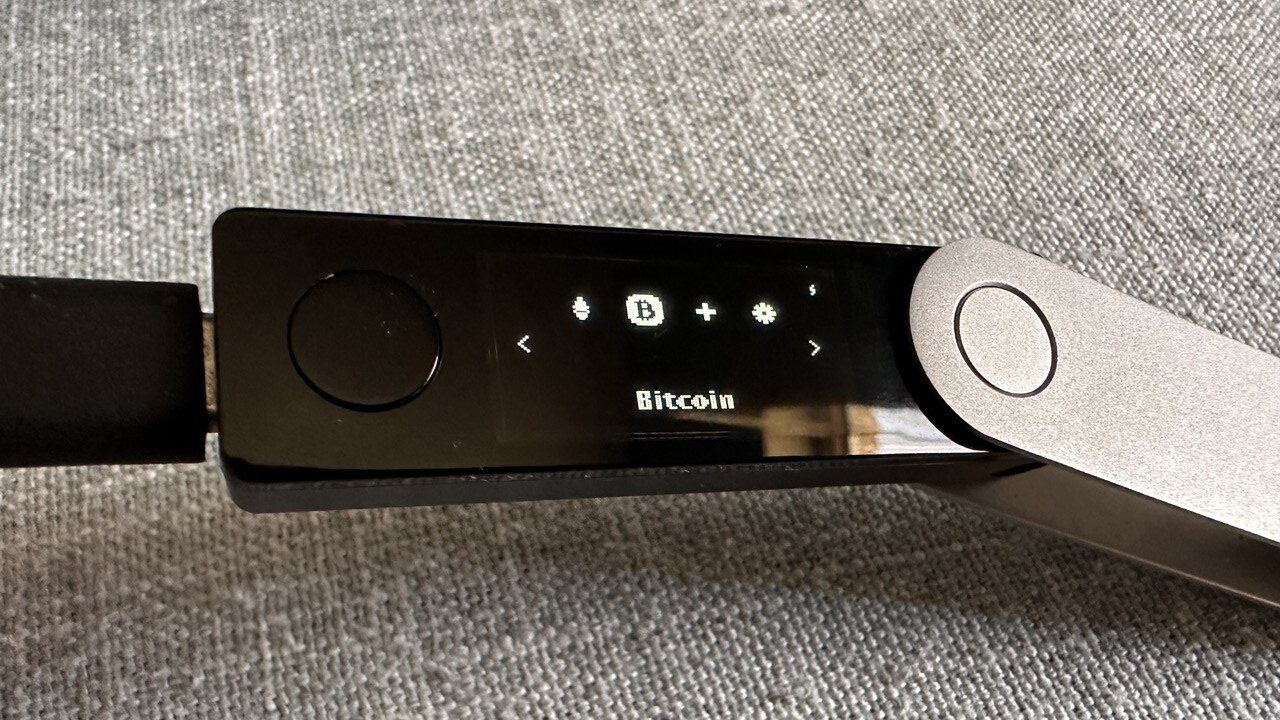
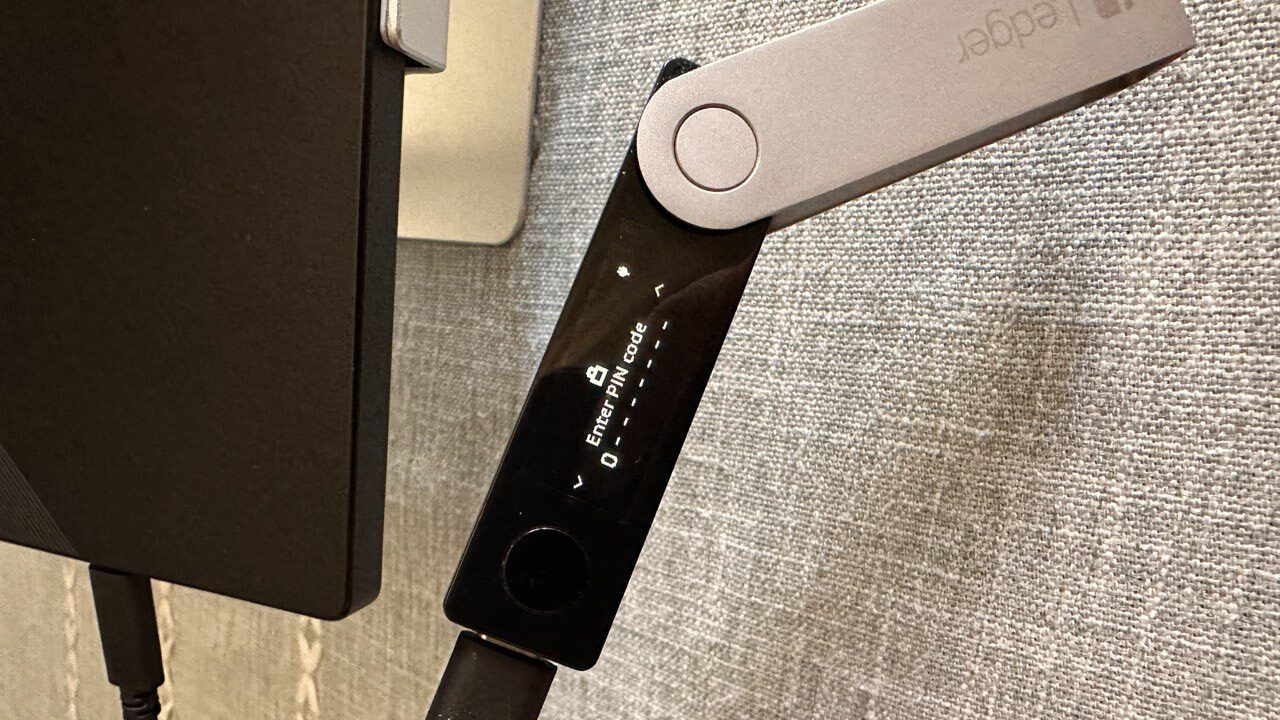
Pros of Ledger Nano X:
- Bluetooth Connectivity: The Nano X’s mobile connectivity via Bluetooth is a major advantage, enabling users to manage their crypto assets on the go through their mobile devices.
- Support for Over 1000 Coins: With support for over 1000 cryptocurrencies, the Nano X ensures that users can securely store all their well-known and commonly traded coins in one place, eliminating the need for multiple wallets.
- Strong Security: Ledger is a leader in cryptocurrency security, and the Nano X is considered one of the safest ways to store and manage cryptocurrencies, offering peace of mind to users.
Cons of Ledger Nano X:
- Setup Complexity: Setting up the Nano X can be a bit time-consuming and may require multiple steps. Some users have experienced issues with the Bluetooth connection, which can hinder the setup process.
- Price: The Ledger Nano X is relatively more expensive compared to some other hardware wallets in the market. While its capabilities justify the cost, it may be considered costly by some users.
What makes it best:
If you’re looking for a reliable and user-friendly hardware wallet to secure your cryptocurrency assets, the Ledger Nano X is a top choice. With a year of extensive use, the Nano X has proven to be a vast improvement over its predecessor, the Nano S, in terms of stability and user experience. Updating the firmware is now a breeze, and managing apps on the device is a straightforward and well-laid-out process. Its two-button navigation system, though not ideal for everyone, offers a smoother experience than the Nano S.
Storage Capacity: The Nano X offers ample storage space, allowing you to store up to 100 unique apps on the device simultaneously. This feature maximizes your ability to manage an extensive portfolio of cryptocurrencies all in one place. The improved coin support is also a significant advantage, with close to 1300 cryptocurrencies supported, making it a compelling option for those with diverse holdings.
Security: Despite initial concerns about the inclusion of Bluetooth, the Nano X has proven to be secure with no notable Bluetooth-related hacks reported in its year of existence. Every action on the device requires physical confirmations from the user, mitigating the risks associated with potential attacks. Plus, the larger and clearer screen enhances usability, making reviewing transactions and managing apps more comfortable, even for those with visual impairments.
Overall, the Ledger Nano X is worth the investment. If you already own a Nano S, upgrading to the Nano X will provide more stability, better app support, and an improved user experience. For newcomers to hardware wallets, the Nano X’s ease of use and wide coin support make it an excellent option for safeguarding your crypto assets. Consider the Nano X if you’re looking for a secure, versatile, and user-friendly hardware wallet to manage your cryptocurrency holdings effectively.
3 standout features of Ledger Nano X:
- Hidden wallet for enhanced security: The Ledger Nano X offers a unique hidden wallet feature that allows you to create a second wallet with a different 25th-word passphrase and PIN code. This hidden wallet can be used to store more significant amounts of crypto assets or sensitive NFTs while keeping them discreet from potential threats. Even if someone gains access to your main wallet, they won’t be able to access the hidden wallet without the second PIN code, adding an extra layer of security.
- Hidden account feature: With the Ledger Nano X, you can hide specific accounts from your Ledger Live portfolio. This means you can keep your hidden wallet completely confidential and undetectable within the app. Even if someone sees your Ledger Live app or demands access to it, they won’t find any trace of the hidden wallet unless you enter the second PIN code and reveal it intentionally.
- Device reset mechanism: To protect your crypto assets further, the Ledger Nano X has a security mechanism that allows you to reset the device to its factory settings by entering the wrong password three times. This feature is useful in situations where you suspect your Ledger might be compromised or in the wrong hands. However, be sure to back up your 24-word recovery phrase in a secure location to prevent the loss of your funds during the reset process.
Trezor Model T

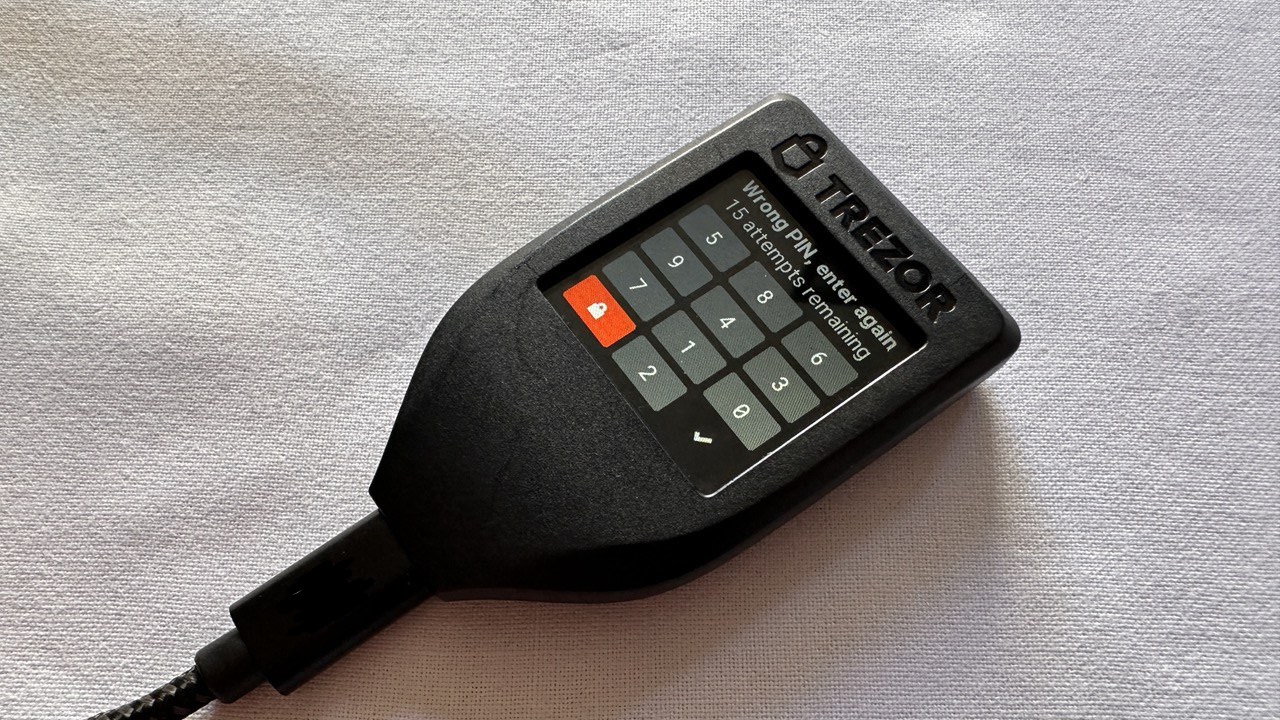
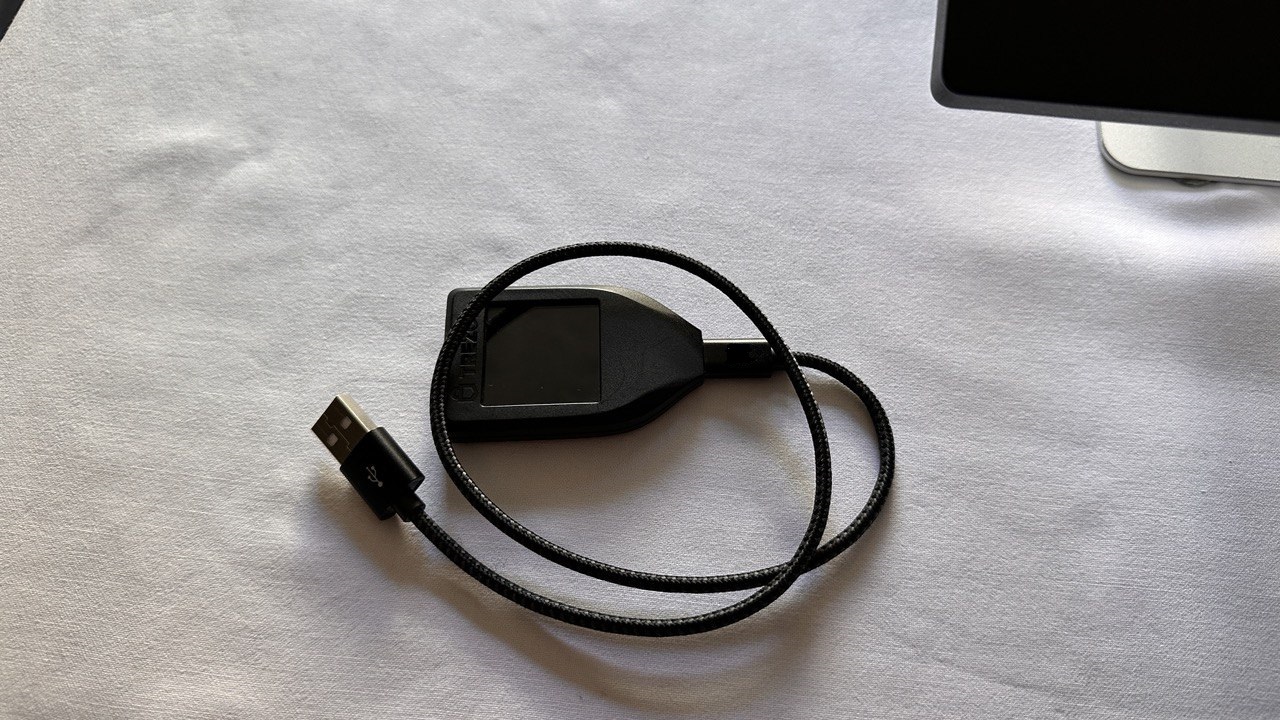
Pros of TREZOR Model T:
- Robust and Feature-Rich: The TREZOR Model T is a highly capable hardware wallet that provides robust security for storing cryptocurrencies offline. It supports over 1000 coins and tokens, including some not available on its predecessor, the TREZOR One.
- Touchscreen Interface: One of its standout features is the touchscreen interface, allowing users to set up the wallet directly on the device, enhancing security by keeping sensitive data away from the computer.
- Reputable and Ultra Secure: Released by Satoshi Labs, a well-respected name in the Bitcoin community, the TREZOR Model T is known for its high-security standards, making it a reliable choice for safeguarding digital assets.
Cons of TREZOR Model T:
- Higher Price Tag: Compared to other popular hardware wallets like the Ledger Nano X, the TREZOR Model T comes with a higher price point, making it a less budget-friendly option for some users.
- Small Touchscreen: While the touchscreen feature is convenient, some users found it to be a bit small and not as user-friendly as they would have preferred.
- Competing Software: Although the Model T boasts open-source software, the Ledger Nano X gains an edge with its interaction with mobile phones and the more robust Ledger Live software, making it a preferred choice for some users.
What makes it best:
The TREZOR Model T is a highly secure and feature-rich hardware wallet designed to store cryptocurrencies offline, away from potential hackers. It has a 10-year track record, and its open-source software and hardware make it trustworthy in the crypto community. The touch screen interface adds to its user-friendliness, ensuring that sensitive data remains on the device and not on your computer.
The TREZOR Model T supports over 1000 coins and tokens, including popular ones like XRP, XMR, and EOS. It allows you to generate wallet addresses and perform transactions directly from the device, while the TREZOR Suite provides a user-friendly desktop app for additional functionalities. One unique feature is the ability to create hidden wallets, adding an extra layer of protection in case of unwanted access.
Though it might be pricier than some competitors, the TREZOR Model T justifies the investment with its exceptional security and trustworthy track record. Its seamless integration with popular dApps like MetaMask makes it versatile, and its commitment to open-source principles ensures that users can trust the security of their crypto holdings. Overall, the TREZOR Model T is a solid choice for safeguarding a variety of altcoins and is a must-have for anyone serious about securing their crypto assets.
3 standout features of Trezor Model T:
- Native Monero Support: The TREZOR Model T stands out for its ability to support cryptocurrencies like Monero, which are not natively supported by many other hardware wallets. This makes it a preferred choice for users who want to secure a diverse range of coins, including popular altcoins.
- Unique Passphrase Feature: The Trezor Model T offers a powerful passphrase feature that enhances the security of your assets. With this feature, you can create hidden wallets without the need for a second hardware wallet or additional recovery seed. By adding a secret word or a sentence of up to 50 characters to your recovery seed, you can generate new wallets, protect your coins in a hidden wallet, create fake wallets to confuse potential hackers or manage multiple wallets from a single recovery seed.
- Versatility: The TREZOR Model T offers more than just cryptocurrency storage. It can function as a secure password manager and safeguard GPG keys. This versatility makes it a valuable tool for users seeking an all-in-one solution for managing their digital assets and enhancing overall online security.
Ellipal Titan

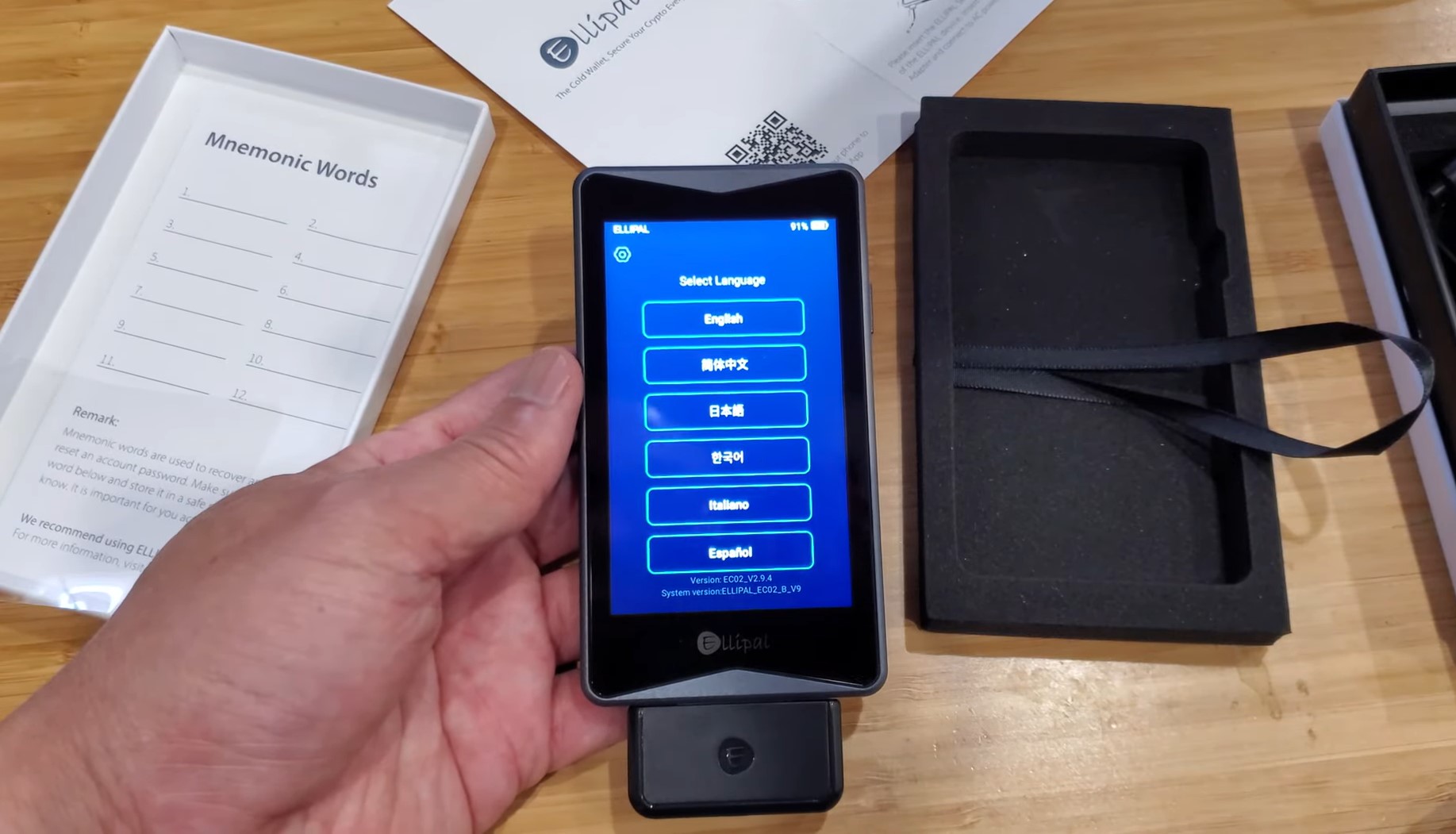
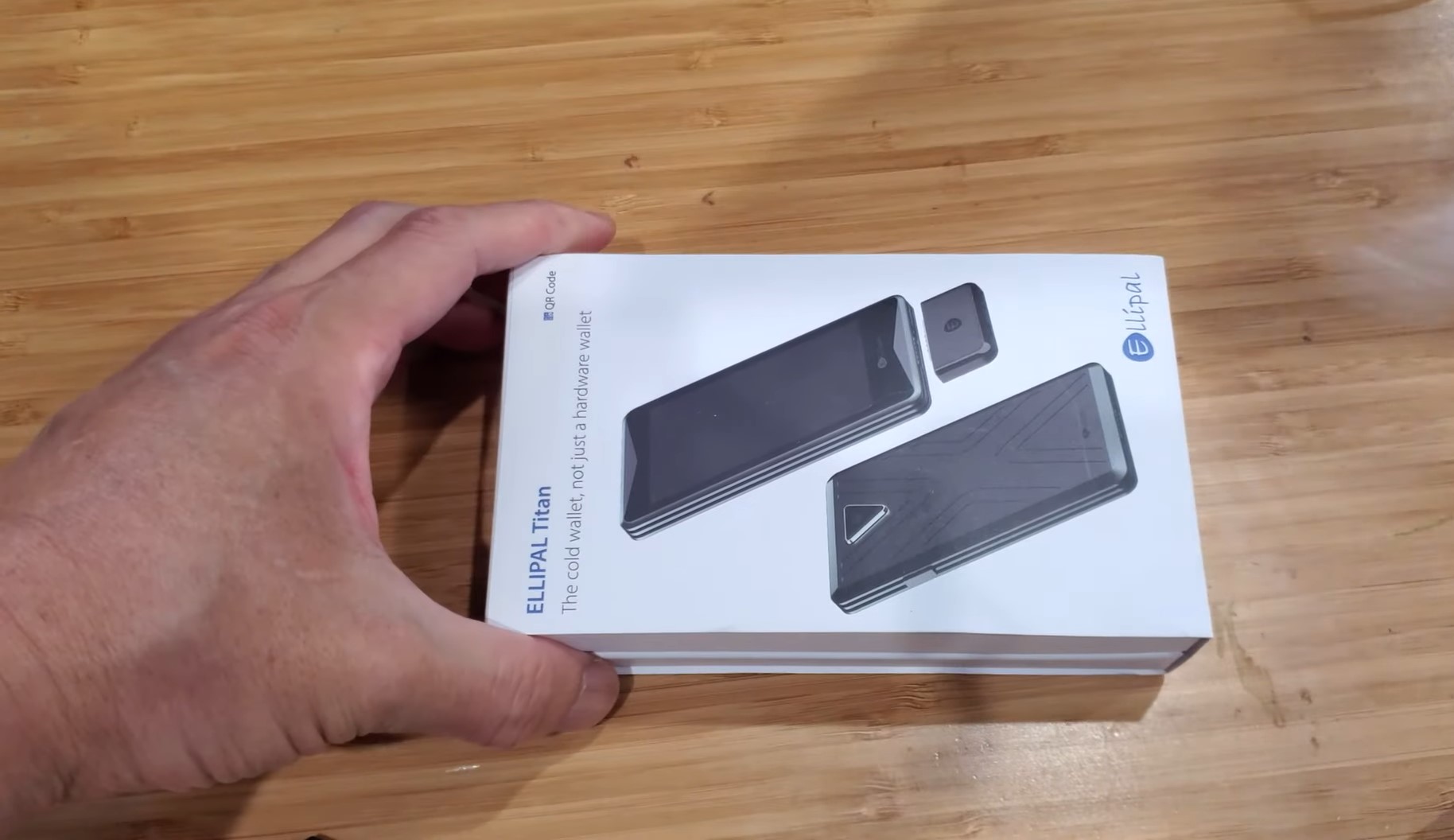
Pros of the Ellipal Titan:
- Air-gapped Cold Storage: The Ellipal Titan is a completely air-gapped cold wallet, meaning it has no components that can connect to the internet, such as Bluetooth or Wi-Fi. This ensures that your cryptocurrency assets are securely stored offline, minimizing the risk of hacking or unauthorized access.
- Support for Multiple Tokens: The Ellipal Titan supports around 35 blockchains and over 7,000 tokens, including major cryptocurrencies like Bitcoin and Ethereum. It also allows you to add thousands of other tokens, making it versatile for managing various digital assets.
- Secure QR Code Transactions: The device uses QR codes for transactions, enhancing security by requiring multi-step processes that involve scanning QR codes with the app and the cold wallet. This two-step verification ensures that unauthorized transactions are nearly impossible, providing peace of mind for users.
Cons of the Ellipal Titan:
- Complexity of Transactions: While the QR code security adds a layer of protection, it also adds complexity to transactions, requiring multiple steps with QR code scanning and the use of passwords. Some users may find this process cumbersome compared to more straightforward hardware wallets.
- No Native Internet Connectivity: While being air-gapped is a significant security feature, it also means that you cannot connect the device to the internet for quick updates or real-time balance checks. Users will have to use other means to check their balances or update the firmware.
- Limited Color Options: The Ellipal Titan comes in two color options (gray and gold), which might not appeal to users who prefer a broader range of color choices for their hardware wallet.
What makes it best:
The Ellipal Titan stands out as one of the best crypto wallets due to its user-friendly experience, robust security, and convenient air-gapped design. As described in the review, the wallet provides a simple and easy-to-navigate interface, making it ideal for both beginners and experienced users. With a large touchscreen and seamless integration with the iOS or Android app, users can manage their cryptocurrencies effortlessly by scanning QR codes for transactions, ensuring a smooth and secure process without the need for any external connections like Bluetooth or Wi-Fi.
The Ellipal Titan’s security features contribute significantly to its reputation as a top-notch crypto wallet. Its anti-tampering design protects against unauthorized access, and in the event of any tampering, the wallet’s self-destruct mechanism wipes the private keys, keeping the funds secure. This strong emphasis on security and hardware durability ensures users’ peace of mind, knowing that their digital assets remain safe from potential threats. Moreover, the ability to store a wide range of cryptocurrencies and support for staking on certain networks add to its appeal, demonstrating Ellipal’s commitment to staying relevant and adaptable in the dynamic crypto landscape.
Despite its numerous advantages, the Ellipal Titan does have a few areas for improvement. The process of adding more coins and conducting firmware updates can be cumbersome, especially for certain operating systems like macOS, requiring separate micro SD cards and specific adapters. Additionally, while it currently supports a substantial number of cryptocurrencies, the wallet could benefit from adding more proof-of-stake coins to accommodate the growing trend of staking and passive income opportunities. Simplifying the transaction process by reducing the number of steps required for signing unsigned QR codes would also enhance the overall user experience. Nevertheless, considering its excellent security, ease of use, and adaptability, the Ellipal Titan remains a top choice for individuals seeking a reliable and user-friendly hardware wallet for managing their digital assets securely.
3 standout features of Ellipal Titan
- Air Gap Technology: One of the standout features of the Ellipal Titan is its air gap technology. Unlike other cold storage wallets that connect to the internet or other devices via Bluetooth or USB, the Ellipal Titan remains completely offline. This enhanced security measure ensures that private keys are never exposed to potential online threats, providing a safer environment for storing and transacting cryptocurrencies.
- Touchscreen Interface: The Ellipal Titan boasts a user-friendly touchscreen interface, allowing users to interact with the device in a manner similar to using a smartphone. This intuitive design makes it easy to navigate through various features and functions, including creating accounts, managing passwords, and scanning QR codes for transactions.
- Wide Range of Supported Coins and Tokens: The Ellipal Titan supports a diverse array of 48 blockchains and over 10,000 tokens. Users can store, buy, and stake various cryptocurrencies directly from the wallet app, making it a comprehensive solution for managing multiple assets securely in one place.
Here is a clear table of characteristics and features of the mentioned hardware crypto wallets:
| Features | Ledger Nano X | Trezor Model T | Ellipal Titan |
| Supported Coins | 5500+ | 1000+ | 10000+ |
| Security | Secure Element, proprietary OS, 2FA, PIN code, key encryption | Firmware authentication, 2FA, password manager, BIP39 passphrase | Air-Gapped, PIN code, password, PIN code gestures and numeric passwords |
| Navigation | Color screen, physical buttons | Color touch screen, physical button | Color touch screen, QR code scanning camera |
| Connecting | USB-C, Ledger Live, Bluetooth for mobile devices | USB-C, Trezor Suite (PC and WEB) | USB-C, Crypto Bitcoin Wallet (Android и iOS) |
| Ease of use | Bright screen, easy navigation | Large touch screen | Clear display, intuitive interface |
| Additional features | Built-in Secure Element chip, storage of up to 100 private keys | Shamir backup function, physical tamper protection | Automatic self-destruction in case of tampering, camera for scanning QR codes |
| Charging | USB-C | USB-C | USB-C |
| Application | Ledger Live, access to DeFi-applications, NFT and more | Trezor Suite (PC and WEB) | Crypto Bitcoin Wallet (Android и iOS) |
The best online cryptocurrency wallets (Web wallets) 2023
There are several popular online cryptocurrency wallets (web wallets) in 2023 that are widely used and have a good reputation.
Blockchain.com Wallet
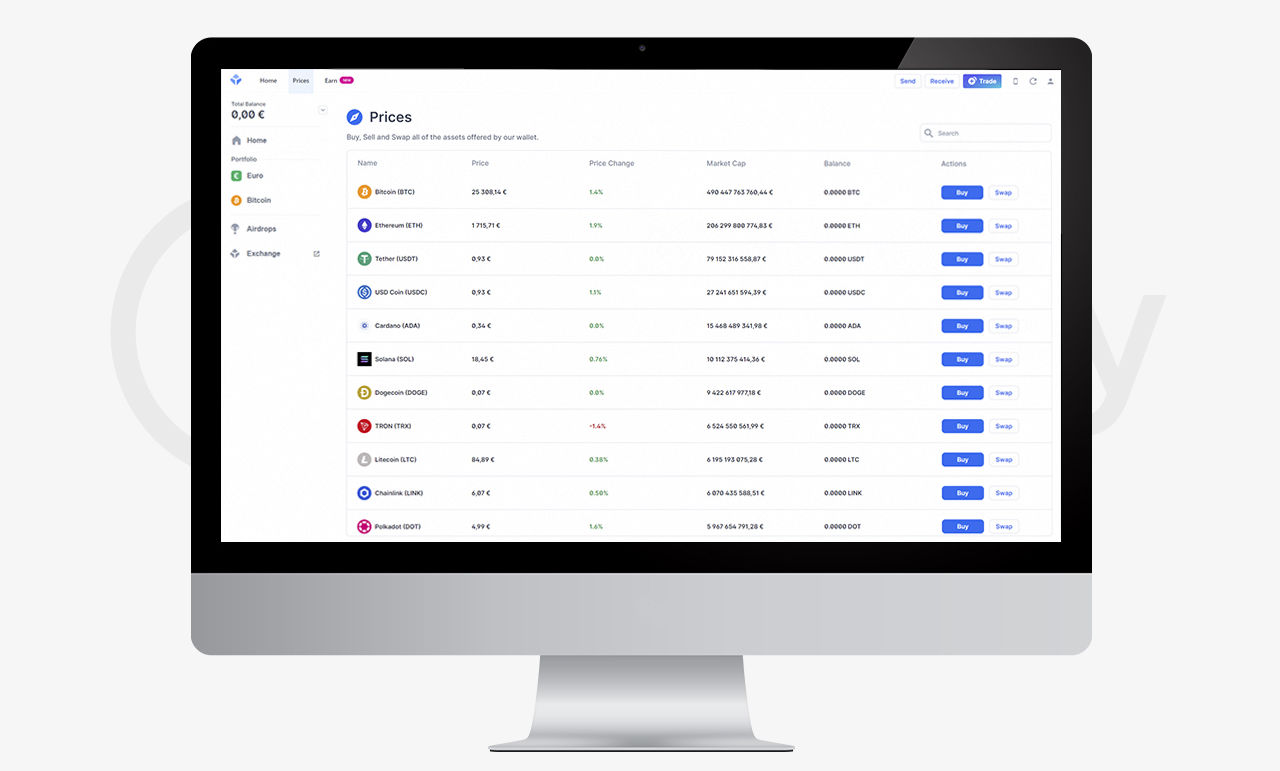
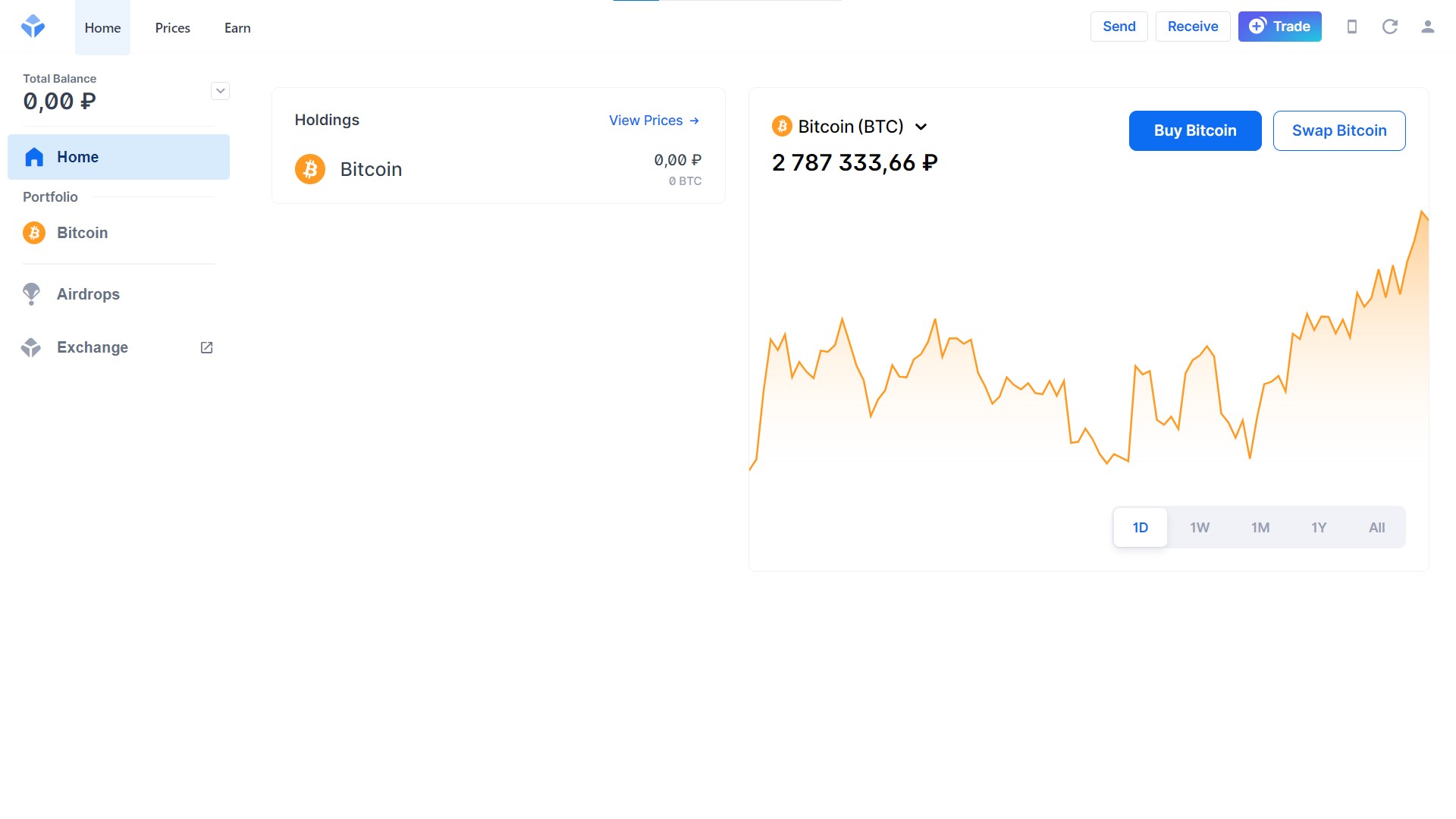
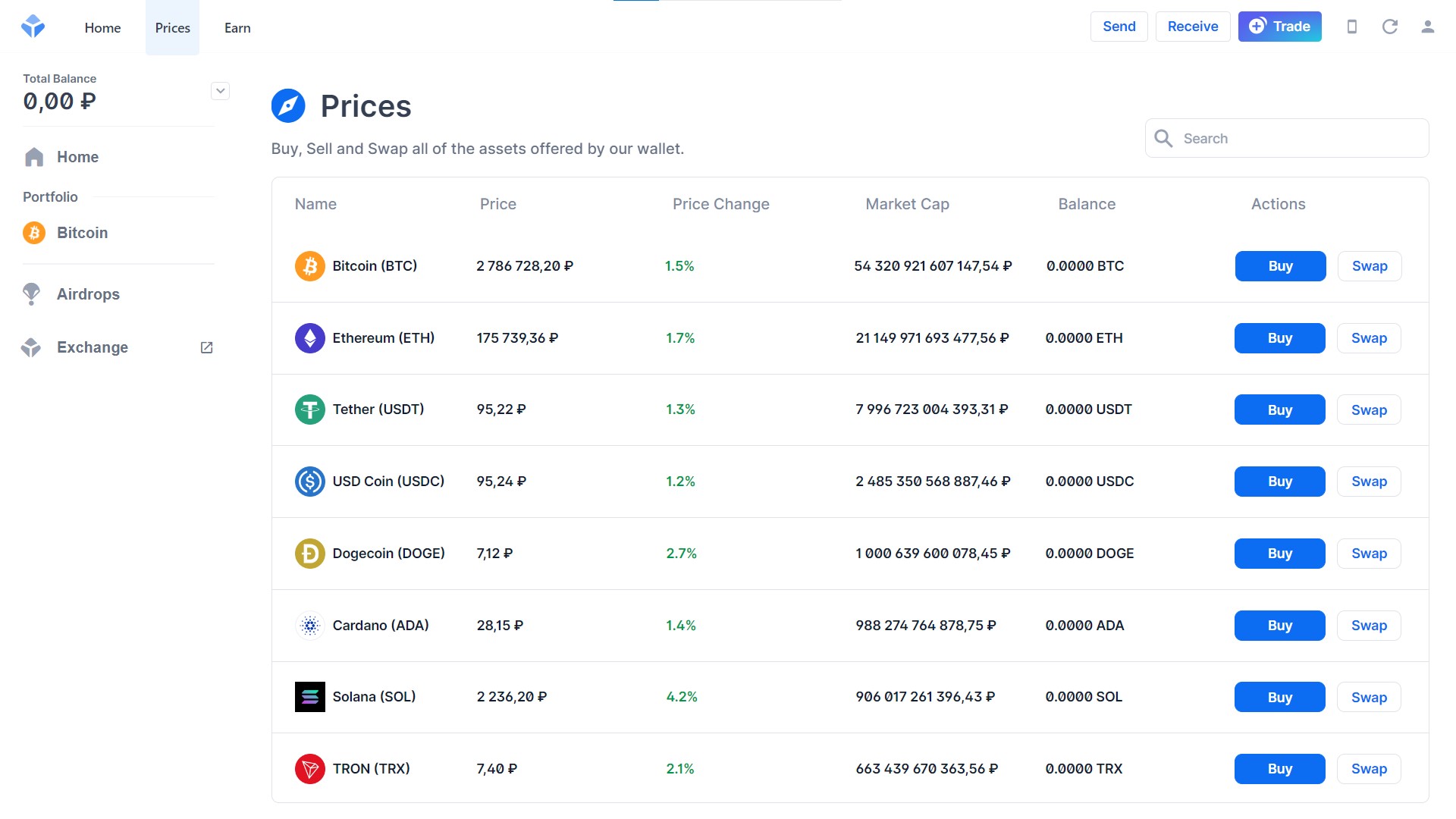
Pros of using Blockchain.com wallet:
- Established reputation: Blockchain.com has been around since 2011 and has gained trust within the cryptocurrency community.
- User-friendly: The wallet is beginner-friendly and easy to navigate, making it suitable for newcomers to the cryptocurrency world.
- Large user base: The wallet boasts over 48 million users, indicating its popularity and widespread adoption.
- Wide range of supported cryptocurrencies: The wallet supports various cryptocurrencies, including Bitcoin, Ethereum, Bitcoin Cash, Stellar, and USD Digital.
- Security features: It offers 2-factor authentication and the ability to back up private keys, which enhances security and protects against unauthorized access.
- Integration with Blockchain’s other products: Blockchain.com offers a full suite of products, including an exchange platform, a hardware wallet (Lockbox), and an API for developers, creating a comprehensive ecosystem.
Cons of using Blockchain.com wallet:
- High transaction fees: The wallet’s market orders might involve slightly inflated rates, resulting in higher transaction fees.
- No built-in selling feature: Blockchain.com has removed the sell option from its wallet, prompting users to move to their exchange platform for selling crypto.
- Limited fiat deposit/withdrawal options: To perform fiat transactions, users need to be gold-level verified, and the supported fiat options might vary depending on the user’s location.
- Dependence on third-party access: Since the wallet is non-custodial, users are responsible for managing their private keys securely. Losing access to the keys can lead to loss of funds with no third-party assistance.
What makes it best:
Blockchain.com wallet stands out as one of the premier choices for cryptocurrency enthusiasts due to its robust security features and non-custodial nature. It provides users with a secure e-wallet, allowing them to store their entire digital currency portfolio safely. Moreover, the wallet allows in-app purchases of various cryptocurrencies, making it convenient for users to add to their holdings seamlessly.
The platform’s appeal is further enhanced by its low trading fees and support for different trade orders, including margin trading. This empowers users to optimize their trading strategies and potentially boost their profits. Whether engaging in fiat-to-crypto trades or crypto-to-crypto transactions, Blockchain.com facilitates seamless and efficient exchanges, offering a wide range of cryptocurrencies to choose from.
Blockchain.com also offers a comprehensive blockchain explorer system that generates accurate and reliable blockchain data. Users can access charts and portfolios of top blockchain wallets, enabling them to make well-informed decisions based on real-time information. Furthermore, the platform integrates with BitPay, a payment solution service, enabling vendors to easily incorporate cryptocurrency payments into their services. To top it all off, Blockchain.com’s mobile app ensures easy access to trading facilities on the go, catering to both beginners and seasoned investors alike, making crypto trading more accessible than ever.
3 standout features of Blockchain.com Wallet:
- Non-Custodial Main Wallet: One of the standout features of Blockchain.com is its non-custodial main wallet. Upon purchasing cryptocurrencies through the platform, all coins are immediately deposited into the user’s digital wallet. This ensures that users have full control and ownership of their assets, enhancing security and trust in the platform.
- In-App Crypto-to-Crypto Swaps: Blockchain.com offers a user-friendly and convenient way for customers to make crypto-to-crypto swaps within the main wallet. This feature enables seamless and instant exchanges of different cryptocurrencies, empowering users to diversify and manage their portfolio effectively.
- Customizable Trading View: The platform provides traders with a customizable trading view, allowing them to personalize the type of charts they wish to view. Whether it’s candlestick charts of top portfolios or other market data, users can tailor their trading experience to suit their preferences and strategies.
Exodus Wallet

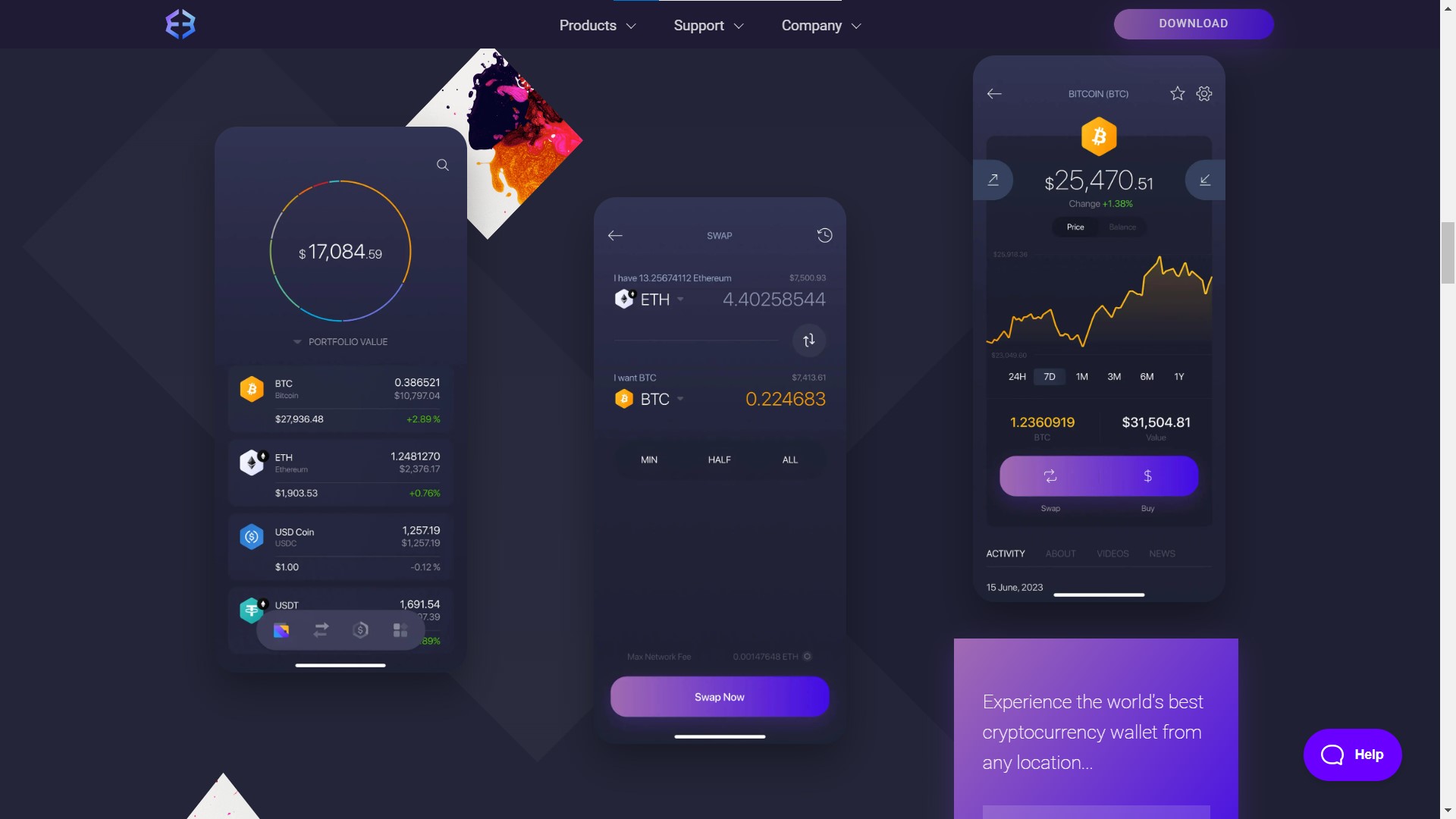
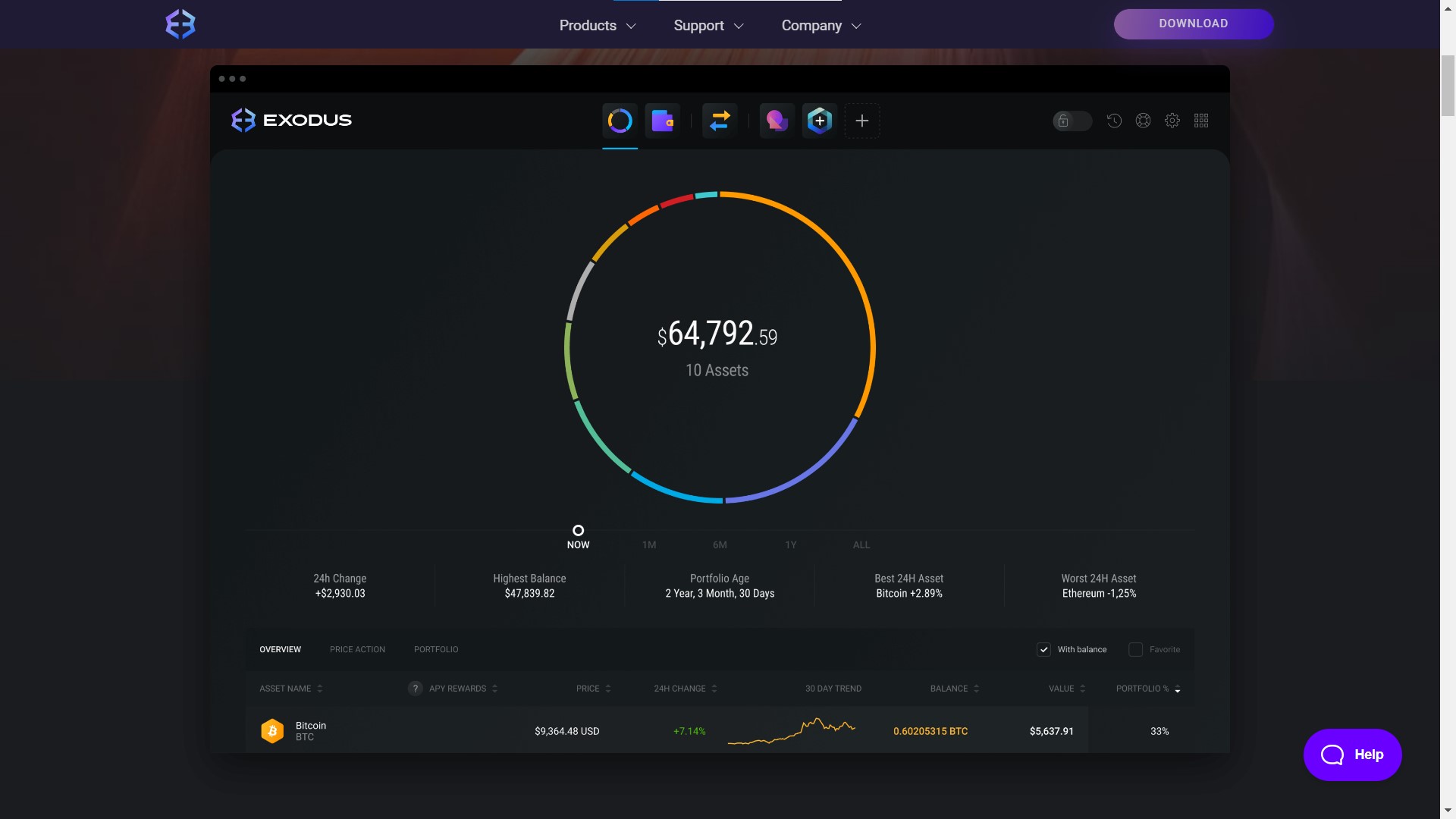
Pros of Exodus Wallet:
- User-Friendly Interface: The Exodus wallet boasts an intuitive and easy-to-use interface, making it ideal for beginners and experienced users alike.
- In-Built Exchange: The integrated exchange within the wallet enables users to trade cryptocurrencies conveniently without the need to access external exchanges.
- Staking and Earning: Users can stake certain supported tokens, like Solana and Cardano, directly from the wallet, earning staking rewards with ease.
- NFT Gallery: The Exodus NFT Gallery allows users to store and manage Solana NFTs directly in the wallet.
- Founder Reputation: Founded by experienced professionals, Exodus benefits from JP Richardson’s coding expertise and Daniel Castagnoli’s UI/UX design background.
- Future IPO: The planned initial public offering (IPO) offers a unique opportunity for users to own a stake in the Exodus company.
Cons of Exodus Wallet:
- Limited Open Source: The wallet’s code is not fully open source, which may raise concerns for users seeking complete transparency.
- Third-Party Exchange Integration: For access to additional features and lower fees, users may need to install external exchange applications within the wallet.
- No Support for Some Cryptocurrencies: Exodus does not support certain cryptocurrencies like XMR, XRP, or EOS, limiting users who hold these assets.
- Local Storage Dependency: As the private keys are stored locally on the device, users must take extra precautions to protect against potential loss or theft.
What makes it best:
Exodus stands out as one of the best bitcoin wallet apps in the market for several reasons. Firstly, it is a self-custody wallet, providing users with complete control over their private keys. This level of security ensures that no one else, not even Exodus, can access your coins, making it the safest way to store your Bitcoin. The wallet offers various platforms, including mobile, desktop, browser extension, and hardware wallet integration, giving users flexibility and choice in securing their assets.
Another key advantage of Exodus is its extensive support for multiple crypto assets on over 50 blockchain networks. Users can easily swap between BTC and hundreds of other cryptocurrencies within the app, eliminating the need for multiple wallets and simplifying portfolio management. The app also allows users to set their own Bitcoin transaction fees, giving them control over how much they pay for transactions and potentially saving money on fees. Additionally, Exodus integrates with Bitrefill, enabling users to use their Bitcoin to purchase gift cards for popular brands, such as Amazon and Netflix.
Furthermore, Exodus embraces the Bitcoin Lightning Network, facilitating fast and cost-effective payments worldwide. The wallet also provides a Web3 wallet for Chrome and Brave, allowing users to connect to the Rootstock network, expanding the possibilities for Bitcoin-based Web3 applications. With its user-friendly interface, versatile features, and excellent customer support, Exodus is an ideal choice for those seeking a secure and easy-to-use wallet to manage their Bitcoin and other crypto assets.
3 standout features of Exodus Wallet:
- Multi-platform support: Exodus wallet offers the convenience of being available on multiple platforms, including desktop, mobile, and web browser extensions. Users can seamlessly switch between devices and access their assets from anywhere, ensuring flexibility and ease of use.
- Hardware wallet integration: Exodus wallet supports integration with hardware wallets like Trezor, providing an additional layer of security for users’ assets. By linking a hardware wallet, users can keep their private keys offline, protecting their funds from potential online threats.
- Easy swapping and diverse asset support: Exodus allows users to store, manage, and swap between a wide range of cryptocurrencies, supporting millions of crypto assets on over 50 blockchain networks. This eliminates the need for multiple wallets and enables users to manage their diverse portfolios within a single app. Additionally, Exodus facilitates easy swapping of assets using third-party API providers, providing users with a seamless experience for diversifying their holdings.
MyEtherWallet


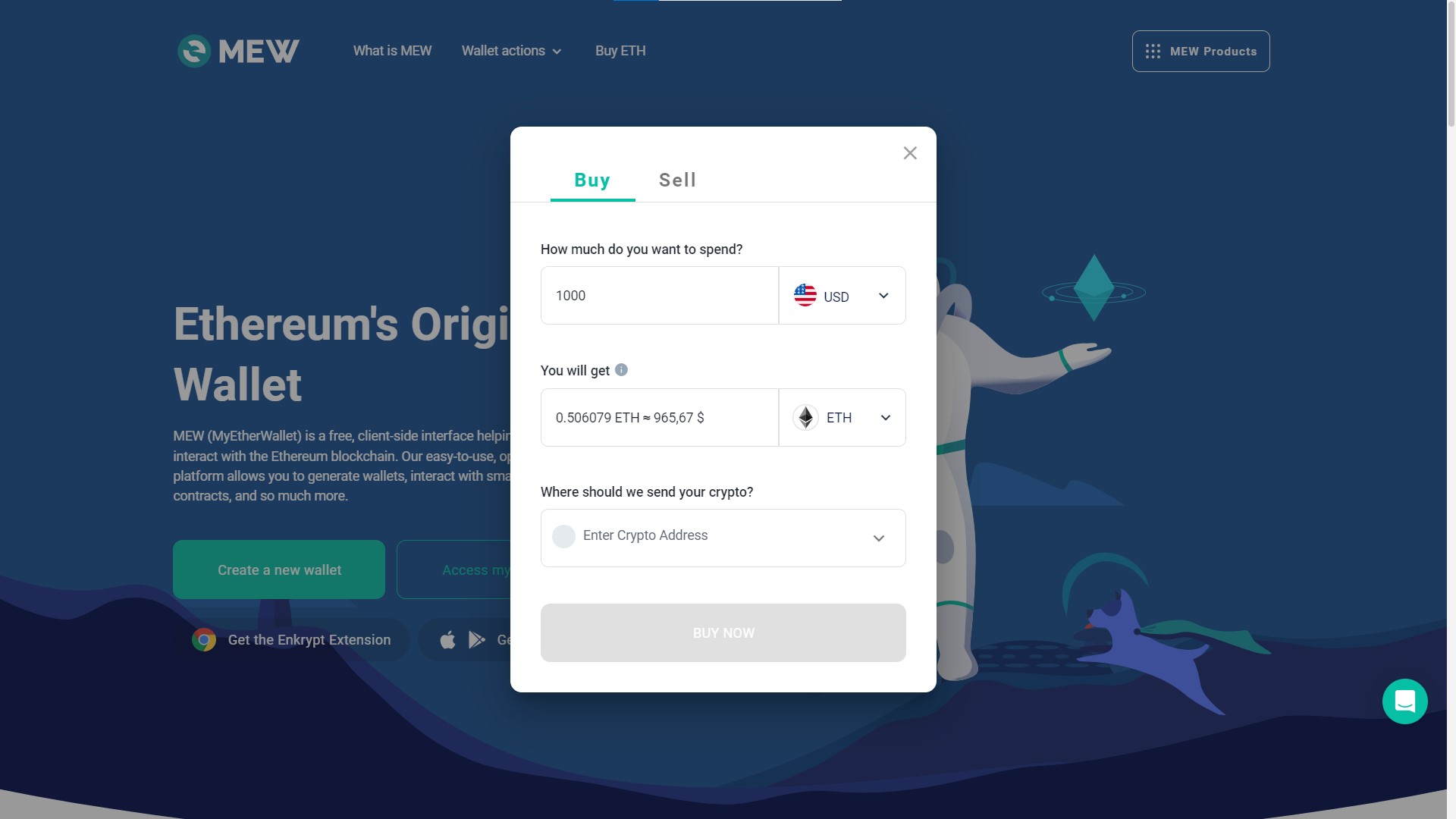
Pros of MyEtherWallet:
- Easy Wallet Generation: MyEtherWallet allows users to quickly generate a cryptocurrency wallet, making it accessible to beginners and those new to the crypto space.
- Control of Private Keys: Users have full control of their private keys, which are essential for accessing their wallet and funds. This gives users ownership and responsibility over their assets.
- Ethereum Name Service (ENS) Integration: MyEtherWallet supports the Ethereum Name Service, which allows users to simplify their wallet addresses with human-readable names, making transactions more user-friendly.
- Transaction Status Check: Users can easily check the status of their transactions on the blockchain network using the transaction hash provided after each transaction.
- Offline Transaction Support: MyEtherWallet allows users to send crypto to offline accounts, offering an extra layer of security for those who prefer to store their assets offline.
Cons of MyEtherWallet:
- Password Recovery: MyEtherWallet lacks a password recovery system. If users forget their password, they may lose access to their wallet and funds permanently.
- Technical Complexity: MyEtherWallet might be overwhelming for inexperienced users due to the technical aspects involved in managing private keys and handling transactions on the Ethereum blockchain.
- Lack of Customer Support: MyEtherWallet does not offer live human support, which can be challenging for users facing issues or needing assistance.
- Third-Party Tools for Staking and Swapping: While MyEtherWallet allows staking and swapping, it relies on third-party providers, which may result in higher fees and less control over the process compared to using dedicated platforms.
- Limited Multicurrency Support: Although MyEtherWallet primarily supports Ethereum-based tokens, it may not offer comprehensive support for other cryptocurrencies, limiting its functionality for users with diverse portfolios.
What makes it best:
MyEtherWallet (MEW) is considered one of the best crypto wallets for several reasons. First and foremost, it provides a secure and user-friendly way to access, send, and receive Ethereum and various tokens on the Ethereum blockchain. MEW does not store any user details on a centralized server, making it more secure as users retain full control of their private keys and funds. It acts as a portal to the Ethereum blockchain, allowing users to manage their assets without relying on a centralized exchange.
MEW supports the Ethereum Name Service (ENS), enabling users to simplify their wallet addresses with human-readable names, making transactions more convenient and user-friendly. Additionally, MEW is compatible with hardware wallets such as Ledger Nano S and Trezor, enhancing security by keeping private keys in a secure vault on the hardware device. This integration ensures that even if users lose their devices, they can still recover their funds using the recovery seed.
The latest version of MyEtherWallet also offers a token swap feature, enabling users to exchange one cryptocurrency for another directly within the wallet. This feature provides users with more flexibility and convenience, eliminating the need to use a centralized exchange for swapping tokens. Overall, MyEtherWallet’s user-centric design, support for hardware wallets, ENS integration, and token swap feature make it one of the most versatile and secure wallets for managing Ethereum-based assets.
3 standout features of MyEtherWallet:
- ERC-20 Token Support: MyEtherWallet (MEW) allows users to store and manage any token that is ERC-20 based on the Ethereum network. This includes not only Ethereum itself but also various other tokens like EOS, TRON, and many others. MEW’s ability to handle multiple tokens makes it a versatile wallet for users who hold different cryptocurrencies on the Ethereum blockchain.
- Offline Wallet Creation: MEW enables users to create a wallet offline, providing an added layer of security. By generating a wallet offline, users can mitigate the risk of potential phishing attacks or exposing their private keys to online threats. The process involves creating a password, downloading a keystore file, and saving the private key, ensuring that users have full control over their wallets’ security.
- Direct Token Swap: MEW offers a built-in token swap feature that allows users to exchange one cryptocurrency for another directly within the wallet. This functionality eliminates the need for intermediaries like exchanges, providing users with a more streamlined and efficient way to manage their crypto holdings. Users can easily swap between different ERC-20 tokens, making it convenient for those who frequently engage in token trading or diversifying their holdings.
Here is a clear table of characteristics and features of the mentioned online crypto wallets:
| Features | Blockchain.com | Exodus | MyEtherWallet |
| Multicurrency | Yes | Yes | Yes |
| Simple interface | Yes | Yes | Yes |
| Security | Private keys, 2FA | Private keys, integration with hardware wallets | Private keys, integration with hardware wallets |
| Exchange and purchase of cryptocurrency | Accessed | Accessed | Sending and receiving ETH and ERC-20 tokens |
| Own Blockchain Explorer | Yes | Yes | Yes |
| Educational resources | Yes | No | No |
| Integration with hardware wallets | No | Yes | Yes |
| Staking support | Yes | Yes | Yes |
| Importing users tokens | No | Yes | Yes |
| Access to DeFi, dApp applications | Yes | Yes | Yes |
| Offline mode | No | No | Yes |
| Availability on different platforms | Web version of the wallet, mobile application (Android, iOS) | Web version of the wallet (Google Chrome and Brave browser extension), mobile application (Android, iOS), desktop wallet | Web version (Enkrypt extension for Google Chrome, Mozilla Firefox, Edge, Opera, Safari browsers), mobile application (Android, iOS) |
The best desktop (software) crypto wallets 2023
Desktop crypto-purses, also known as desktop crypto-wallets or software wallets, are applications installed on a computer or laptop that allow users to manage their cryptocurrencies.
These wallets typically provide full control over private keys, which are the basis for accessing cryptocurrency funds. When a user creates a desktop crypto wallet, a unique pair of keys is generated: a private key and a public key. The private key must be strictly confidential and must never be transmitted over the network. The public key is used to receive payments and wallet addresses. Now let’s take a look at a few popular desktop crypto wallets.
Guarda wallet

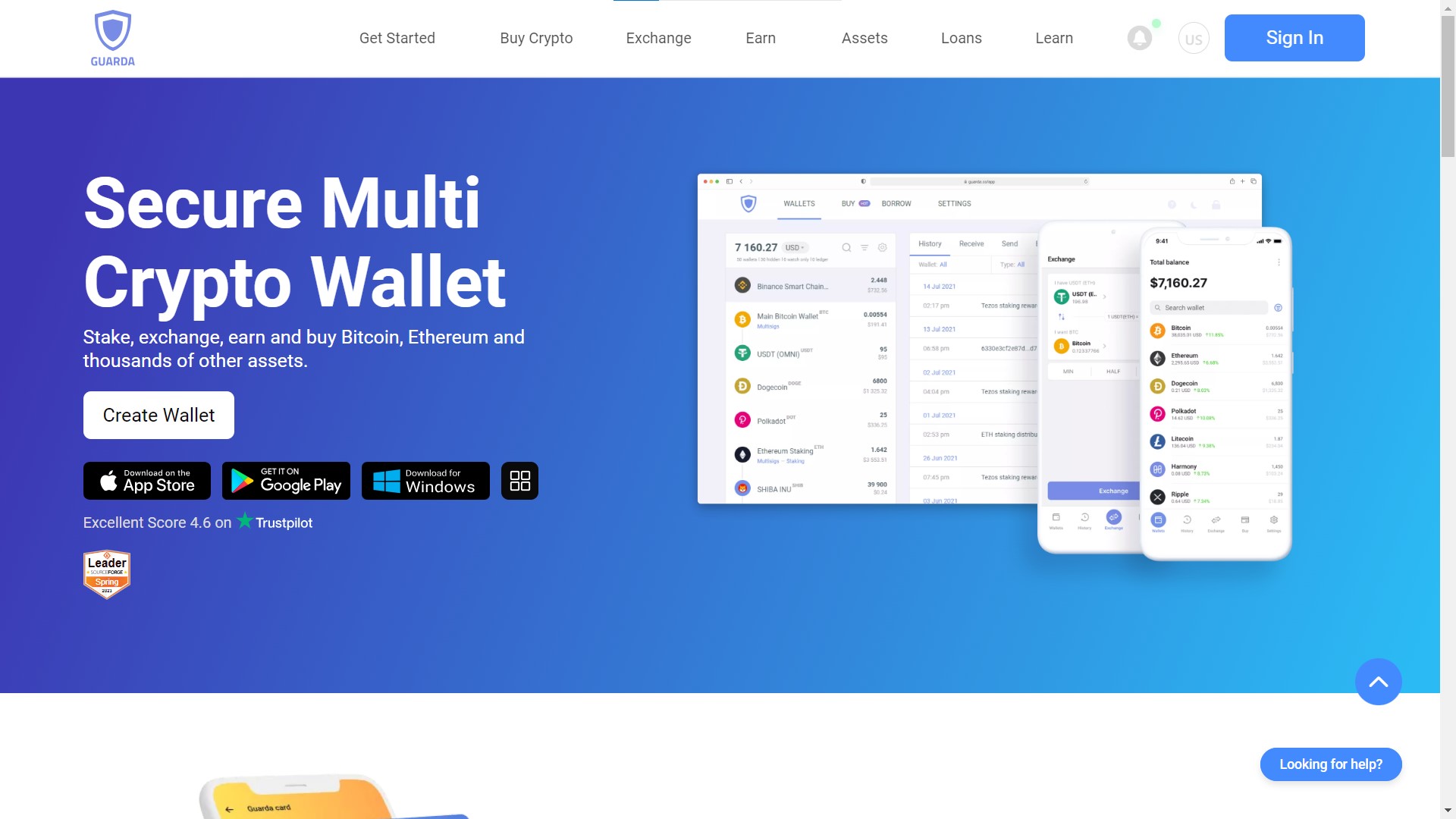
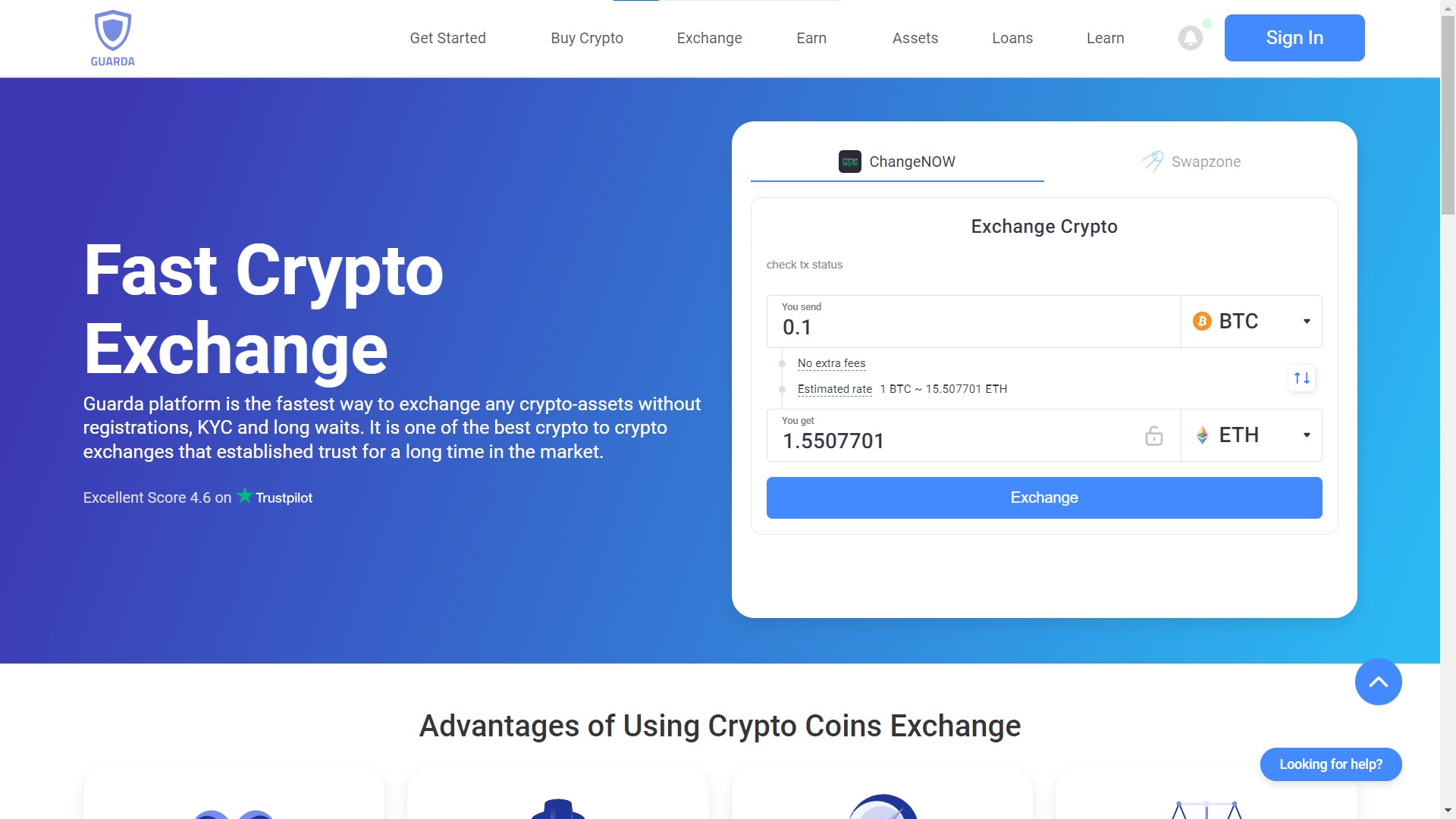
Guarda Wallet Pros:
- Multi-Coin Support: Guarda Wallet supports a wide range of cryptocurrencies, including popular coins like Bitcoin, Ethereum, EOS, and many others. It also supports tokens on various networks such as Ethereum, Binance Smart Chain, Tron, Waves, and more, making it a versatile wallet for users with diverse crypto holdings.
- Cross-Platform Availability: Guarda Wallet is available on multiple platforms, including Windows desktop, Chrome extension, Android, and iOS devices. This cross-platform support allows users to access and manage their cryptocurrencies seamlessly across different devices.
- Regular Updates and New Coin Additions: Guarda Wallet has been around for a while and is continuously updated, adding support for new coins and tokens on a frequent basis. This ensures that users have access to a wide range of cryptocurrencies and stay up-to-date with the latest developments in the crypto space.
Guarda Wallet Cons:
- Token Price Display: The wallet does not display token prices, even for tokens listed on well-known platforms like CoinMarketCap and CoinGecko. Users may find this limitation inconvenient when trying to assess the value of their holdings within the wallet.
- Past Support Issues: Our reviewer mentioned having unprofessional experiences with the Guarda support team when requesting the addition of a custom token. Users may want to consider past support issues when evaluating the wallet’s overall reliability and responsiveness.
- Limited Portfolio Details: The wallet’s portfolio display lacks detailed information, such as the percentage breakdown of each cryptocurrency in the overall portfolio. Users may find it helpful to have more comprehensive portfolio statistics for better portfolio management.
What makes it best:
Guarda Wallet stands out as one of the best crypto wallets due to its exceptional multi-coin support and cross-platform availability. With a wide range of cryptocurrencies and tokens supported, including popular coins like Bitcoin, Ethereum, EOS, and many others, Guarda Wallet caters to users with diverse crypto holdings, making it a versatile choice for investors and enthusiasts alike. Moreover, the wallet’s support for tokens on various networks like Ethereum, Binance Smart Chain, Tron, and Waves further enhances its utility.
Additionally, Guarda Wallet’s availability on multiple platforms, such as Windows desktop, Chrome extension, Android, and iOS devices, offers users seamless accessibility and convenience. Whether users prefer to manage their cryptocurrencies on their desktop or on the go via their mobile devices, Guarda Wallet accommodates their preferences. Furthermore, the wallet’s regular updates and continuous addition of new coins ensure users stay up-to-date with the latest developments in the crypto space, further solidifying its position as one of the best crypto wallets on the market.
3 standout features of Guarda Wallet:
- Wide Coin and Token Support: Guarda Wallet boasts a remarkable range of supported cryptocurrencies and tokens, covering not only major coins like Bitcoin and Ethereum but also a vast array of altcoins and tokens on different networks, including Binance Smart Chain, Tron, Waves, and more. This extensive support allows users to manage their diverse crypto portfolios all in one place.
- Cross-Platform Compatibility: Guarda Wallet offers its services on various platforms, including Windows desktop, Chrome extension, Android, and iOS devices. This cross-platform compatibility ensures that users can access their wallets and manage their assets conveniently, regardless of their preferred device or operating system.
- Built-in Swapping and Staking: The wallet features an in-built swapping feature that allows users to exchange cryptocurrencies directly within the platform, making it easy to diversify their holdings without relying on external exchanges. Additionally, Guarda Wallet supports staking for certain cryptocurrencies, enabling users to participate in various staking programs and earn rewards for holding their coins on the platform. These features make Guarda Wallet a comprehensive and user-friendly solution for managing and growing crypto assets.
Coinomi wallet

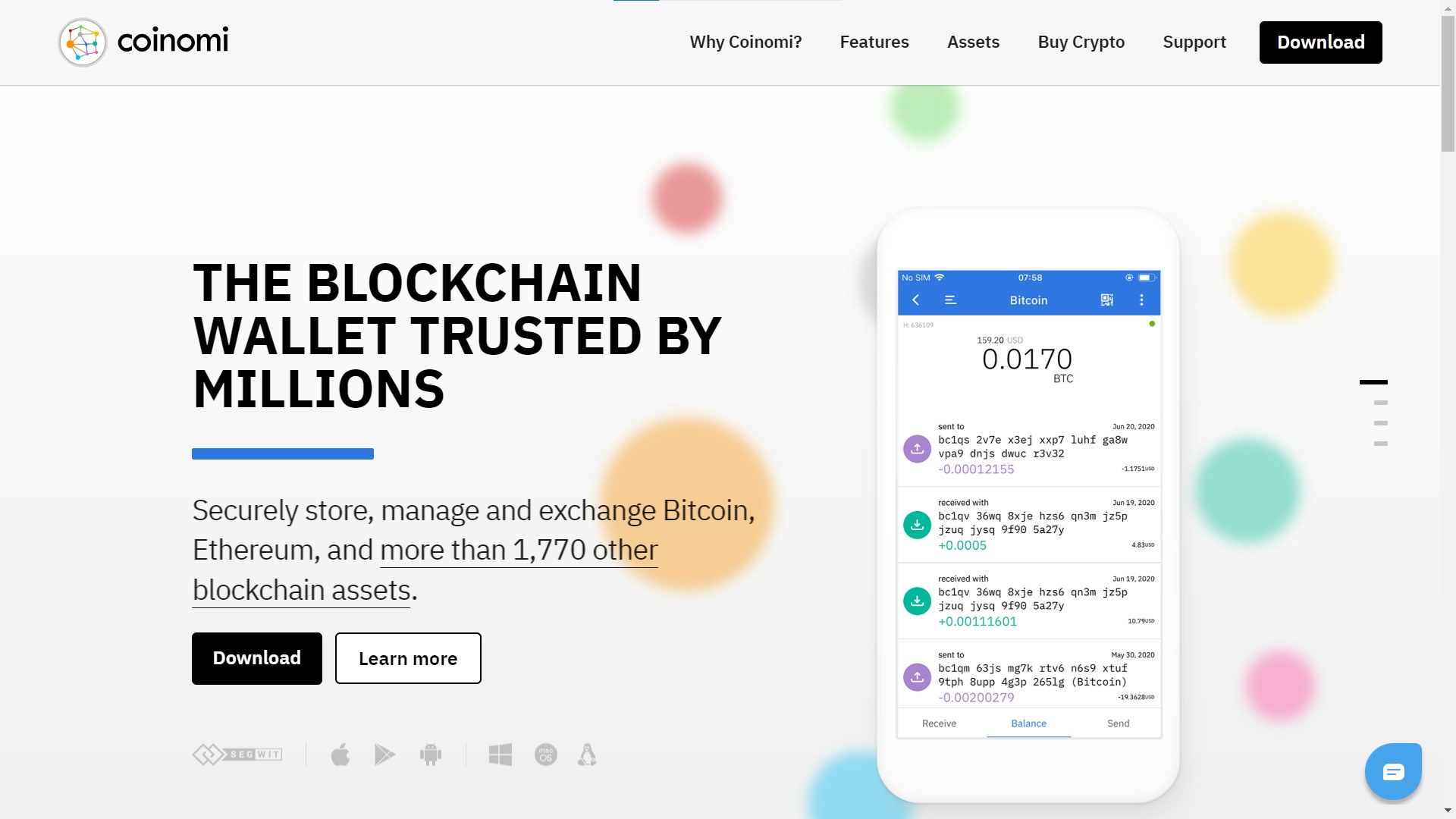
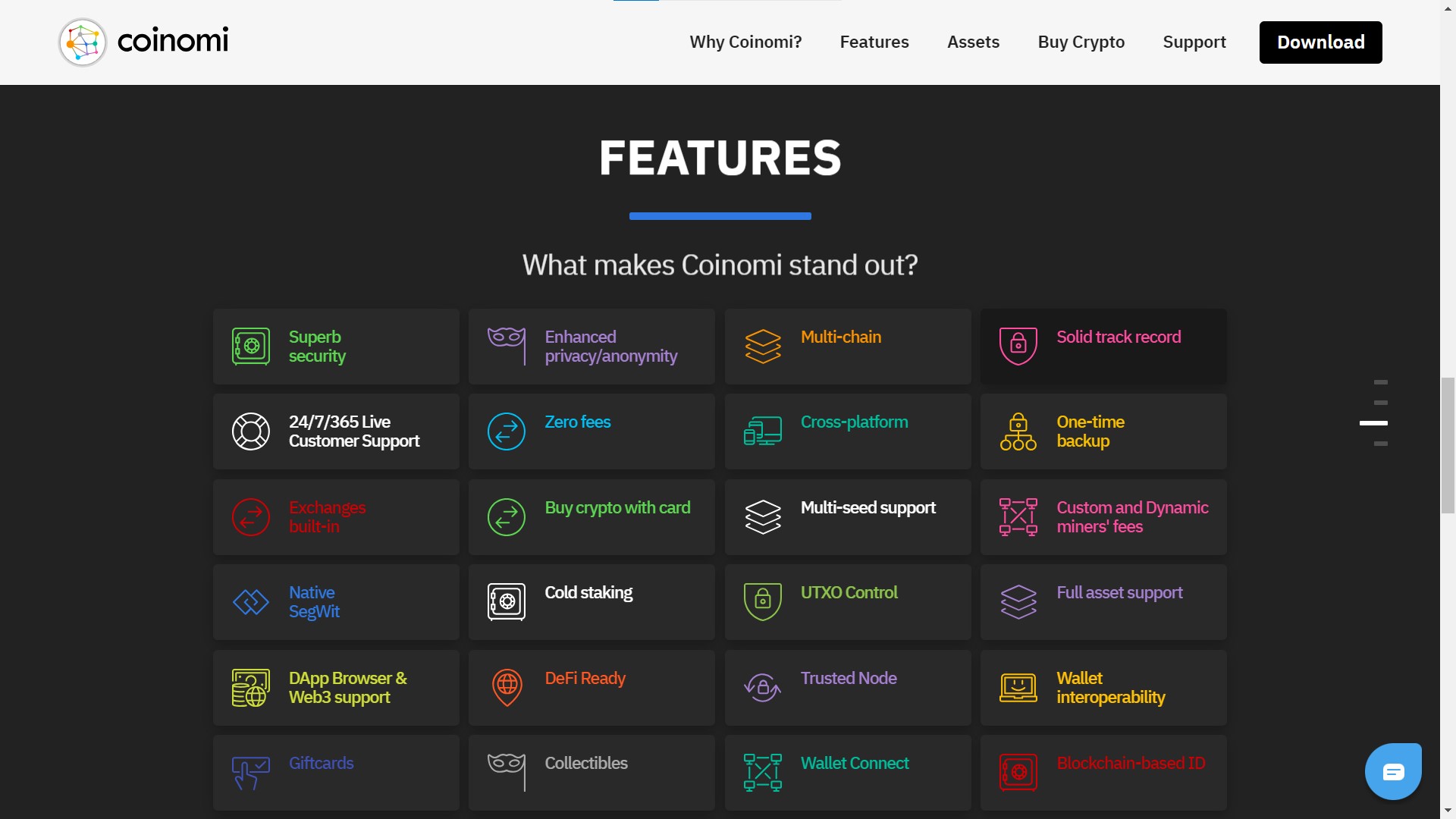
Coinomi Wallet Pros:
- Multiple Wallet Management: Coinomi allows users to create and manage multiple wallets within the interface. This feature is particularly useful for individuals who want to keep their crypto holdings separate, such as for different family members or use cases.
- Wide Coin Support: Coinomi supports a vast range of cryptocurrencies, including older and less common coins. This wide coin support makes it a suitable choice for users with diverse crypto portfolios, as they can store various assets in one wallet.
- Address Book and Sweeping Feature: The wallet offers an address book service, making it easy for users to store frequently used addresses for quick transactions. Additionally, Coinomi has a sweeping feature, allowing users to claim unclaimed coins like Bitcoin Cash if they hold the corresponding cryptocurrencies.
Coinomi Wallet Cons:
- Slow Development Cycle: Some users have criticized Coinomi for its slow development cycle, especially in terms of adding new coins and updating logos. This slow pace may result in outdated information and limited support for newer or more popular cryptocurrencies.
- High Resource Usage: Coinomi’s desktop version can consume significant CPU resources, which can be a drawback for users with lower-powered devices. The lack of optimization may affect user experience and overall performance.
- Limited Security Features: Coinomi lacks certain advanced security features, such as two-factor authentication (2FA) or hardware wallet support like Ledger. This could be a concern for users seeking enhanced security measures to protect their crypto assets.
What makes it best:
Coinomi Wallet stands out as one of the best crypto wallets due to several key features. Firstly, it supports a vast array of digital assets, covering over 1600 types, making it suitable for users with diverse crypto portfolios. The wallet is also known for its high-level security, offering 100% non-custodial storage. Users have complete control over their keys, transactions, and wallets, enhancing the overall safety of their funds.
In addition to secure storage, Coinomi integrates with Shapeshift and Changelly, enabling users to easily exchange supported assets directly within the wallet. It even allows the purchase of cryptocurrencies using credit cards via their partner, Simplex. Moreover, the wallet supports SegWit for Bitcoin, Litecoin, and select altcoins, ensuring faster confirmations and lower transaction fees for users.
Coinomi’s user-friendly interface and straightforward account creation process add to its appeal, making it accessible for both new and experienced crypto holders. It offers great anonymity by anonymizing IP addresses through servers, ensuring user privacy. The wallet’s positive reviews on platforms like Trustpilot further highlight its reliability and quality of customer service, making it a popular choice among global users. Lastly, and perhaps most importantly, Coinomi Wallet is completely free to use, making it an attractive option for anyone looking for a secure and feature-rich cryptocurrency wallet.
3 standout features of Coinomi Wallet
- Built-in Exchanges: Coinomi Wallet offers built-in support for popular cryptocurrency exchanges like Shapeshift and Changelly. Users can easily exchange cryptocurrencies directly within the wallet without the need to go to external platforms. This feature simplifies and streamlines the process of trading and exchanging digital assets.
- Participate in ICOs: The wallet allows users to participate in Initial Coin Offerings (ICOs) directly from the app. This feature enables users to invest in new token sales without leaving the wallet, making it convenient and efficient for participating in crowdfunding events.
- Extensive Token Support: Coinomi Wallet supports a vast array of cryptocurrencies and tokens, covering over 1600 types of digital assets. Users can easily manage and store various tokens on the platform, making it a versatile solution for those with diverse crypto portfolios. The wallet’s support for numerous tokens sets it apart and caters to the needs of cryptocurrency enthusiasts seeking to manage a wide range of assets.
Atomic wallet

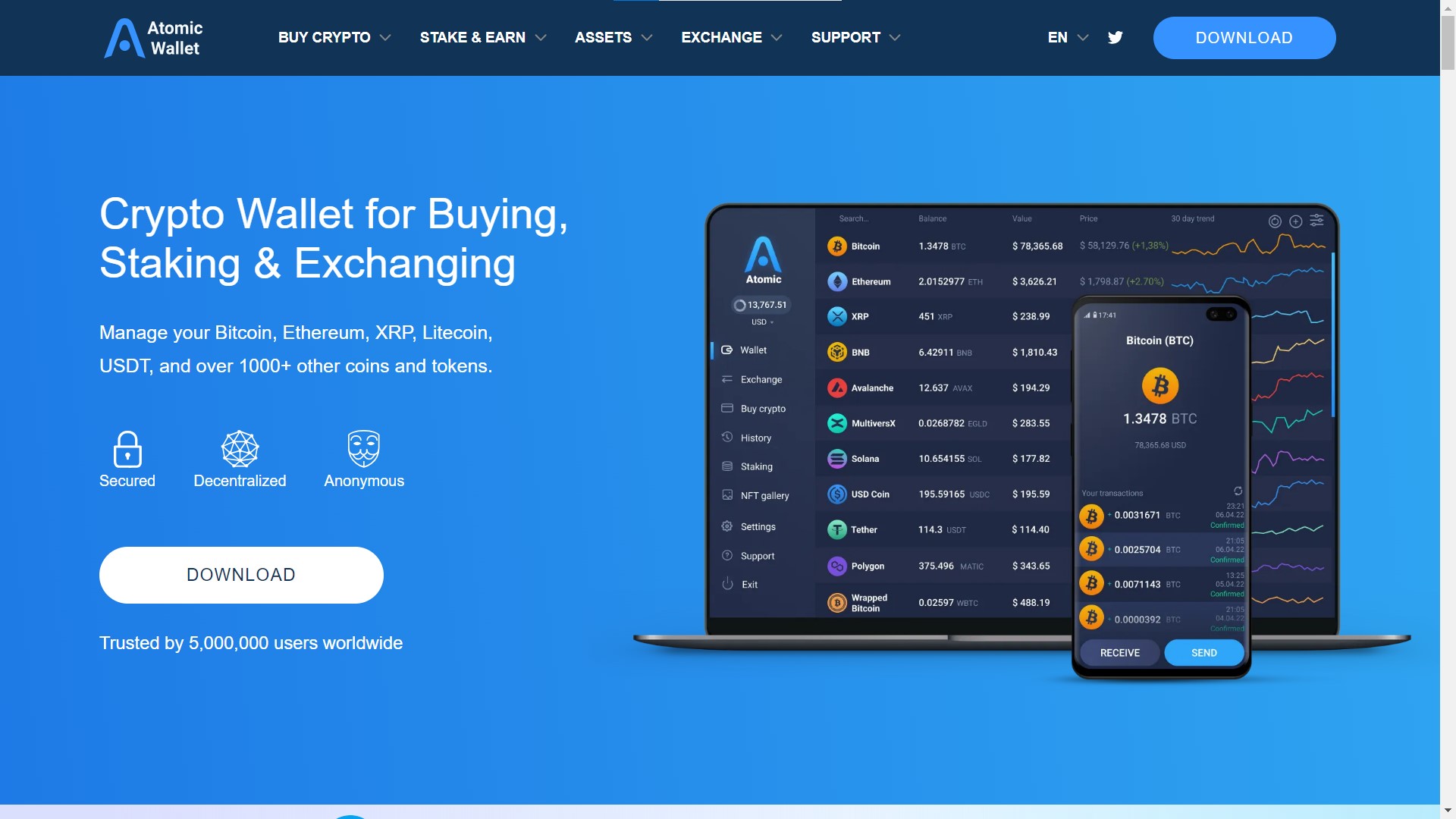
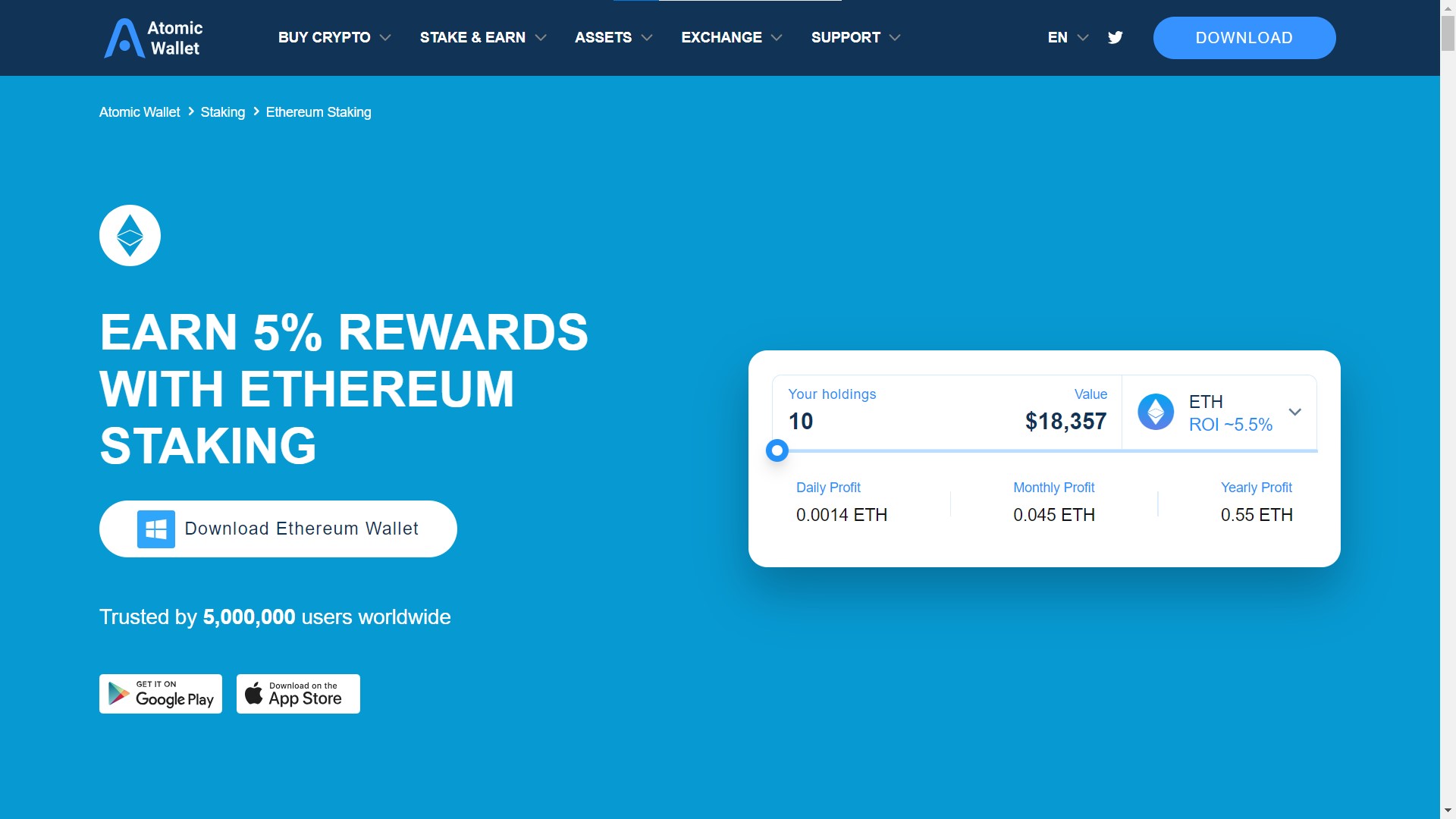
Pros of Atomic Wallet:
- Multi-Asset Support: Atomic Wallet supports a wide range of cryptocurrencies, allowing users to manage and store various digital assets in one place.
- Staking Functionality: The wallet offers staking services for certain cryptocurrencies, enabling users to earn passive income by staking their tokens directly within the wallet.
- Private Keys Control: Atomic Wallet provides users with full control over their private keys. Users can access and manage the private keys for each cryptocurrency held in the wallet, enhancing security and ownership.
Cons of Atomic Wallet:
- Learning Curve: Some users, especially beginners, may find the wallet’s interface and functionalities complex at first, requiring some time to get accustomed to its features.
- Limited Membership Discounts: Atomic Wallet offers membership discounts based on the number of AWC tokens held by users. However, the discounts may not be significant for users holding smaller amounts of AWC.
- Centralized Support: While the wallet offers support and video tutorials, it relies on a centralized support system, which may cause delays in resolving user queries and issues.
What makes it best:
Atomic Wallet is considered one of the best crypto wallets for several reasons. Firstly, it offers support for a wide range of cryptocurrencies, including major ones like Bitcoin, Ethereum, Ripple, Litecoin, and Stellar, as well as over 300 different tokens. This extensive support makes it a one-stop-shop for managing and exchanging various digital assets securely.
Secondly, Atomic Wallet prioritizes security and decentralization. Users own their backup phrase and private keys, giving them complete control over their funds and ensuring that their assets are not held by a third party. This non-custodial approach enhances the wallet’s security and trustworthiness.
Furthermore, Atomic Wallet provides convenient features like anonymous crypto swaps for over 60 pairs and the ability to stake certain tokens with zero fees. Additionally, users can earn rewards through the wallet’s airdrop program, receiving free Atomic Wallet tokens (AWC) just by installing the wallet and using a promo code. These features make Atomic Wallet an attractive choice for both beginners and experienced crypto enthusiasts, offering a user-friendly interface, mobile compatibility, and a thriving community of users.
3 standout features of Atomic Wallet:
- Multi-Currency Support: Atomic Wallet supports a wide variety of cryptocurrencies and ERC-20 tokens. It is not limited to popular cryptocurrencies like Bitcoin and Ethereum but also includes lesser-known tokens, making it a versatile wallet for managing various digital assets in one place.
- Built-in Exchange: The wallet comes with a built-in exchange feature that allows users to swap one cryptocurrency for another directly within the wallet. This eliminates the need to create accounts on external exchanges, making it convenient and user-friendly for quick and hassle-free exchanges.
- Staking Functionality: Atomic Wallet supports staking for certain cryptocurrencies, such as Tron and Neo. Users can stake their holdings and earn rewards in the form of additional tokens or coins. The wallet provides information on the expected staking yield, allowing users to make informed decisions about their staking activities.
Here is a clear table of the features and characteristics of the mentioned desktop (software) crypto wallets:
| Features | Guarda Wallet | Coinomi Wallet | Atomic Wallet |
| Multiplatform | Available for desktop (Windows, macOS, Linux, Ubuntu), mobile platforms (Android and iOS) and Web version | Available for desktop (Windows, macOS, Linux), mobile (Android and iOS) platforms | Available for desktop (Windows, macOS, Ubuntu, Debian, Fedora) and mobile platforms (Android and iOS) |
| Security | High level of security, encrypted password, private key backup, key storage on user’s device | Encryption, local storage of private keys, PIN code, recovery phrase | Encryption, storage of private keys on the user’s device |
| Multicurrency | Support for over 50 blockchains and thousands of cryptocurrencies and tokens | Support for over 125 blockchains and thousands of cryptocurrencies and tokens | Support for over 1000 cryptocurrencies |
| Integration with exchanges | Built-in ability to exchange cryptocurrencies inside the wallet | Integration with popular exchangers | Built-in cryptocurrency exchange and purchase function, integration with exchangers |
| User interface | Clear and user-friendly interface, various functions | Simple and intuitive interface, accessible for beginners | Simple and intuitive interface, accessible for beginners |
| Support for hardware wallets | Integration with Ledger and Trezor, improving security | Support for the use of hardware wallets | Support for the use of hardware wallets |
| Regular updates | Yes | Yes | Yes |
Paper wallets

A paper crypto wallet is a physical printout or document that contains the public address and private keys of a cryptocurrency wallet. The public address is used to send funds to the wallet, while the private keys are used to access and manage the funds in the wallet. Paper wallets are usually generated offline and are considered a form of cold storage, as they are not connected to the internet.
How it works: To create a paper wallet, a user generates a new public address and private keys using a wallet generator. This can be done using trusted wallet software or websites. The generated keys are then printed out on a piece of paper or written down. The paper wallet can be stored securely, such as in a safe or a hidden location.
Benefits:
- Cold Storage: Paper wallets are an offline form of storage, making them less susceptible to online hacks and attacks.
- Control: Users have full control over their private keys, which means they have complete ownership and security of their funds.
- Privacy: As the paper wallet is generated offline, there is no risk of exposing sensitive information to potential online threats.
Risks:
- Physical Vulnerability: Paper is subject to damage, loss, or theft. If the paper wallet is misplaced, destroyed, or stolen, access to the funds may be lost permanently.
- Security During Creation: If the paper wallet is generated using untrusted or compromised software or websites, it may lead to the exposure of private keys, putting the funds at risk.
- Complexity: Paper wallets can be challenging for less tech-savvy users to create and use correctly, leading to potential errors or security vulnerabilities.
CryptoSteel Capsule

A CryptoSteel capsule is a hardware device designed to securely store backup mnemonic phrases and passwords offline. It is made from stainless steel, making it highly durable and resistant to physical damage, such as fire or water. The CryptoSteel capsule provides a secure way to back up mnemonic phrases, which are sets of 12 or 24 words used to generate cryptocurrency wallets.
Mnemonic phrases are an essential part of cryptocurrency wallets, especially in deterministic wallets. A deterministic wallet generates all the private keys from a single seed phrase, making it possible to restore multiple wallets using just that one seed. The seed phrase is a randomly generated 128-bit number that is run through a hashing algorithm to create a checksum. This checksum ensures that the seed is correct and helps in detecting errors when entering the phrase. The 128-bit seed is then divided into segments, and each segment corresponds to a specific word from a predetermined word list. This creates the 12 or 24-word mnemonic phrase that serves as a backup for the wallet.
The CryptoSteel capsule allows users to store the mnemonic phrase securely in a physical format. The capsule consists of metal plates with engraved letters, numbers, and symbols representing the words from the word list. Users manually arrange the correct words on the spindle and use separators and fasteners to lock them in place. The result is a tamper-resistant, durable, and fireproof container for storing the crucial backup information.
Using the CryptoSteel capsule is a great alternative to paper wallets, as it eliminates the risks associated with paper storage. Unlike paper, stainless steel is highly durable and resistant to physical damage, making it an ideal long-term storage solution. Moreover, the engraved letters and symbols ensure that the mnemonic phrase remains legible even after extended periods.
Crypto Wallets: A Complete Guide
What is a crypto wallet
A cryptocurrency wallet is a fundamental tool that allows users to securely interact with the blockchain network and manage their digital assets. It is important to understand that a crypto wallet does not store actual cryptocurrencies. Instead, it serves as a software, hardware, or paper-based mechanism to handle private keys, public keys, and blockchain addresses.
Private keys are long strings of numbers and letters that act like passwords for accessing and authorizing transactions on the blockchain. They are essential for securely signing transactions and ensuring that only the rightful owner of the wallet can spend the funds associated with it. In contrast, public keys are generated from private keys and serve as unique addresses to which other users can send cryptocurrencies.
To illustrate this process, let’s take an example of Alice and Bob. If Alice wants to receive Bitcoin from Bob, she needs to create a Bitcoin wallet. When she does so, the wallet software generates a pair of cryptographic keys: a private key and a corresponding public key. The public key is then used to generate a unique Bitcoin address, which Alice can share with Bob to receive the payment. Bob, using his wallet, sends the Bitcoins to Alice’s address on the blockchain, and the transaction is recorded on the network.
It is crucial for users to protect their private keys since possession of the private key essentially means ownership of the associated digital assets. If someone gains access to the private key, they can transfer the funds to their own wallet, resulting in a loss for the original owner.
Modern wallets often use seed phrases, a set of random words, which can be used to generate multiple private keys. By backing up the seed phrase, users can recover their wallets and funds even if they lose access to their devices.
How does a crypto wallet work
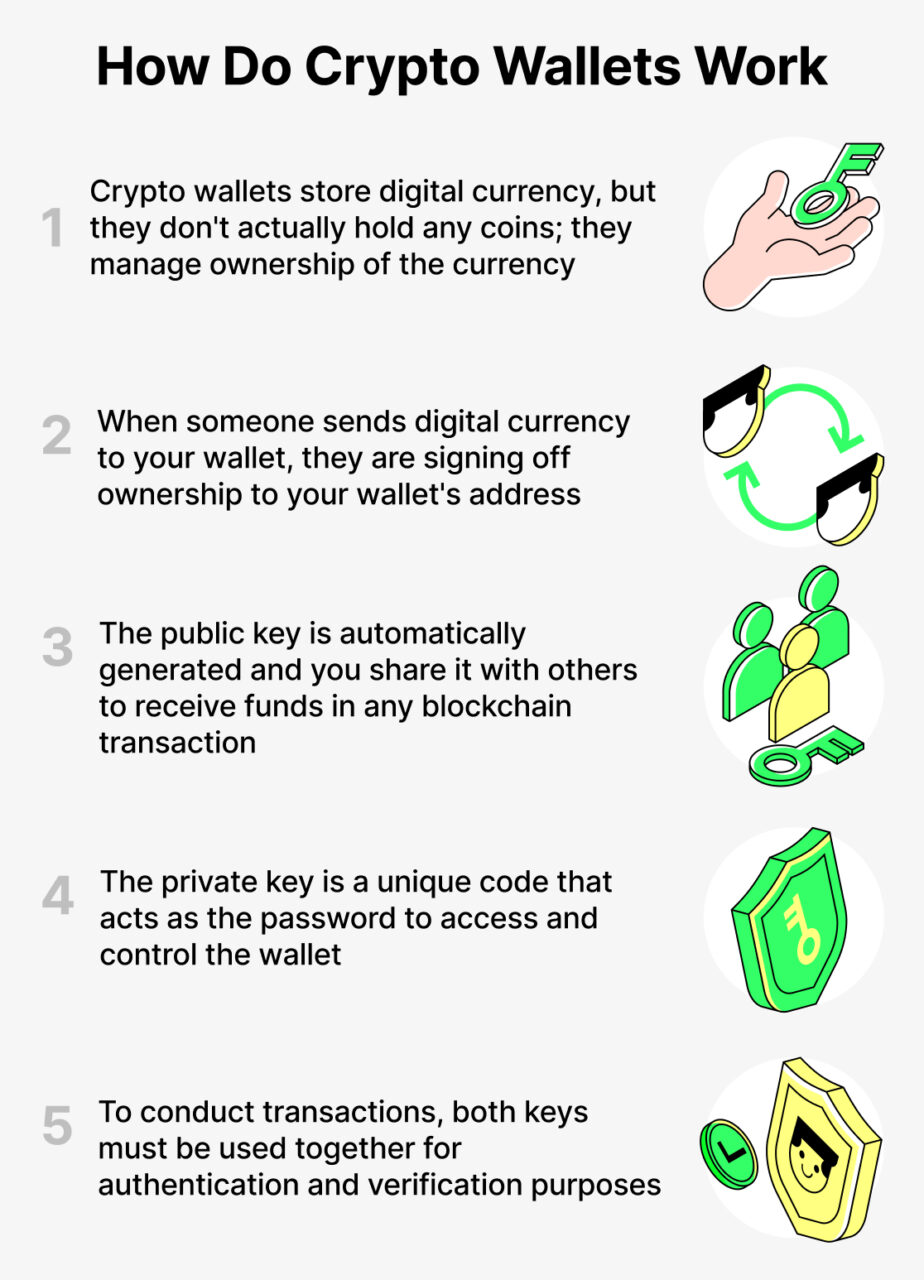
A cryptocurrency wallet is a tool that allows you to interact with a blockchain network. There are three main types of wallets: software, hardware, and paper wallets. Depending on how they work, they may be categorized as hot (connected to the internet) or cold (offline).
Contrary to popular belief, cryptocurrency wallets do not actually store cryptocurrencies. Instead, they function as gateways to the blockchain, providing the necessary tools to use cryptocurrencies. When you create a new wallet, it generates pairs of public and private keys, along with blockchain addresses. The public key is used to receive funds, while the private key, like a password, is used to sign transactions and access your funds.
Most modern wallets use a seed phrase, which acts as a root key and can generate multiple private keys. This means that backing up the seed phrase is essential for wallet recovery.
It’s important to back up your wallet regularly to avoid losing access to your funds, and to understand the advantages and disadvantages of each wallet type before managing your cryptocurrency.
Crypto wallet types
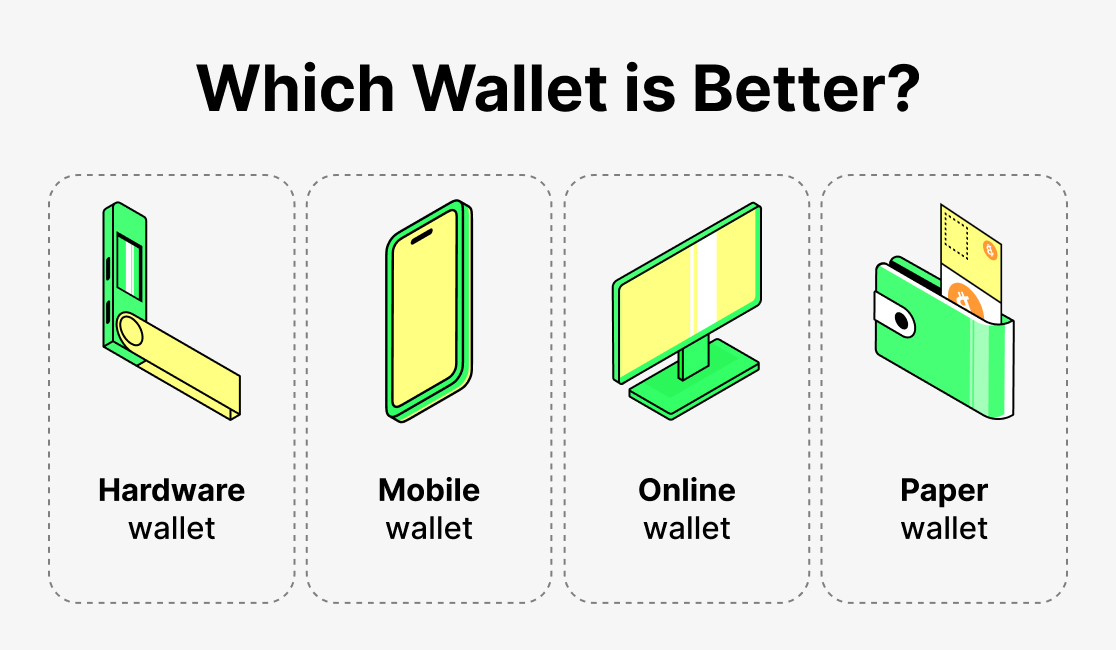
There are different types of crypto wallets available. Software wallets, also known as online wallets, are hosted on third-party platforms such as exchanges like Coinbase or Binance. They store the public and private keys on their servers, allowing users to access their funds through their accounts. While convenient, this type of wallet poses some security risks as the private key is stored online, making it susceptible to hacking attempts.
For enhanced security, users can opt for hardware wallets. These are physical devices, often resembling USB sticks, where the public and private keys are stored offline. The Ledger Live, for example, uses a 24-key phrase system to access the wallet, ensuring that even if someone physically accesses the device, they cannot withdraw the funds without the passphrase.
Software wallets come in three types: web wallets (accessed through a browser interface), desktop wallets (downloaded and executed locally on a computer), and mobile wallets (designed as smartphone apps). Hardware wallets are physical devices that store keys offline, making them resistant to hackers. Paper wallets, which print blockchain addresses and private keys on paper, are discouraged due to their flaws.
Another option is a paper wallet, which involves writing down the public and private keys on paper or generating QR codes. While this is the most secure method as it keeps the keys offline, it is less practical for frequent transactions due to the need to manually enter the private key each time.
It’s important to classify wallets as either hot or cold. Hot wallets are connected to the internet and are more vulnerable to online attacks, while cold wallets are offline and provide better protection against hacking attempts. Choosing the right wallet depends on the user’s preferences, the amount of crypto they hold, and their level of comfort with the security measures.
How to set up a hot wallet
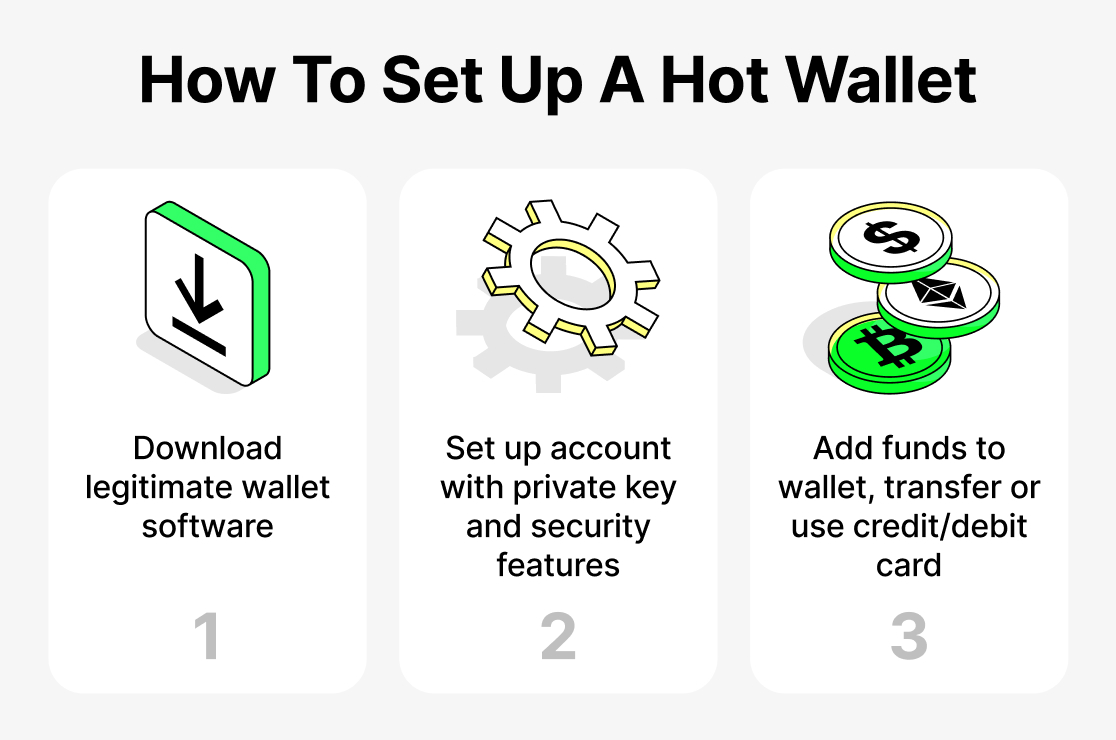
Setting up a hot wallet is a straightforward process, but it’s crucial to follow these steps to ensure the safety of your cryptocurrency:
- Download the Wallet: Begin by downloading the wallet software from a legitimate source. In the cryptocurrency world, scams are unfortunately common, so it’s essential to verify the authenticity of the wallet before installation. Be cautious and ensure you are on the official website and not a fake version designed to steal your information, especially when setting up web wallets.
- Account and Security Setup: During the setup process, you’ll create your account for the hot wallet. If you’re using a non-custodial wallet, you’ll receive a private key, which is a random 12 to 24-word string of words. Keep this private key secure since losing or forgetting it will result in permanent loss of access to your crypto. Additionally, take advantage of security features like two-factor authentication and biometrics for added protection. For custodial wallets, the process involves a Know-Your-Customer (KYC) verification to confirm your identity.
- Add Funds to Your Wallet: Depending on the type of hot wallet, the process of adding funds may differ. For non-custodial wallets, you might need to transfer cryptocurrency from another wallet or exchange since not all wallets allow direct purchases using fiat currency. For custodial wallets, you can fund them using a credit or debit card before you can start purchasing cryptocurrencies in some cases.
How to set up a cold wallet
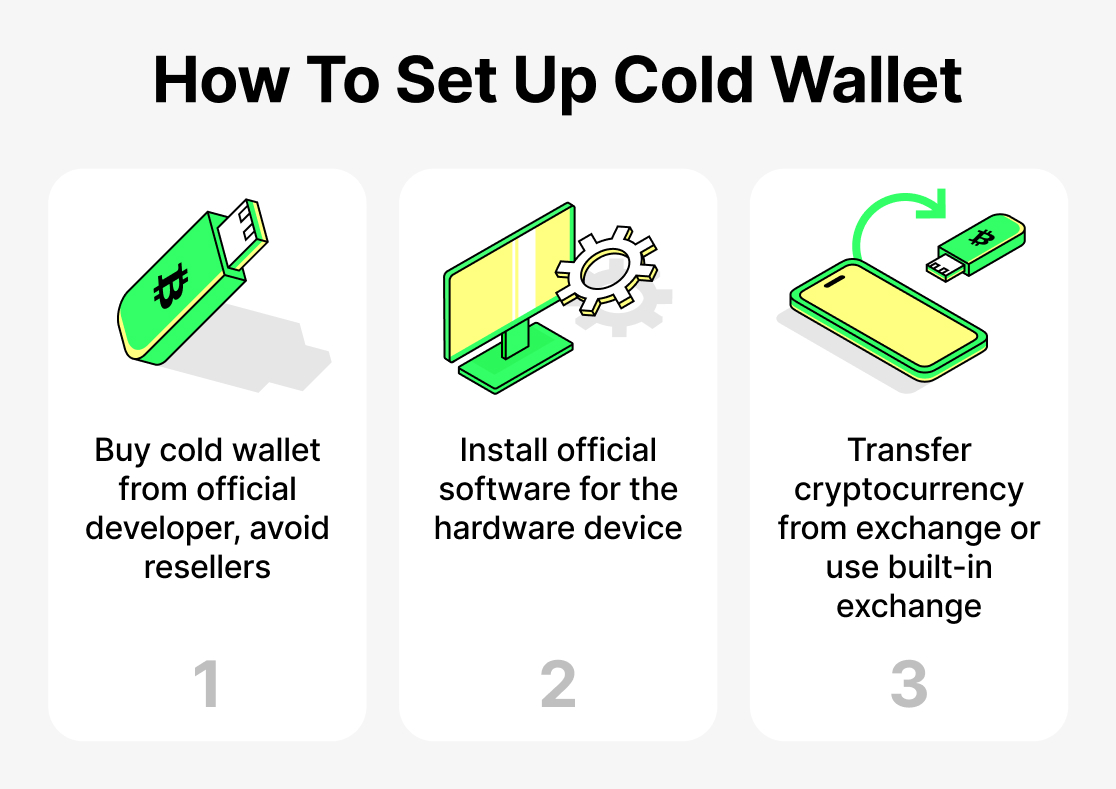
Setting up a cold wallet is a secure way to protect your cryptocurrencies. Here’s a step-by-step guide to help you get started:
- Purchase the Wallet from Reputable Shops: When acquiring a cold wallet, it’s crucial to buy directly from the developer to ensure the authenticity and integrity of the device. Avoid third-party resellers, as there’s a risk of tampering with the device before you receive it. Stick to reputable shops and the official website of the wallet’s manufacturer.
- Install the Device’s Software: Each brand of cold wallet comes with its own software that needs to be installed on the hardware device. To begin, download the software from the official website of the company. Follow the provided instructions to set up and create your crypto wallet. This step ensures that the wallet is properly initialized and ready to use.
- Deposit Your Cryptocurrency: Once your cold wallet is set up, you’ll need to transfer your cryptocurrencies into it from other sources, such as a cryptocurrency exchange. Some cold wallets may have an integrated exchange feature, allowing you to trade cryptocurrencies while the device is connected to your desktop computer or mobile device.
Tips on how to choose a crypto wallet
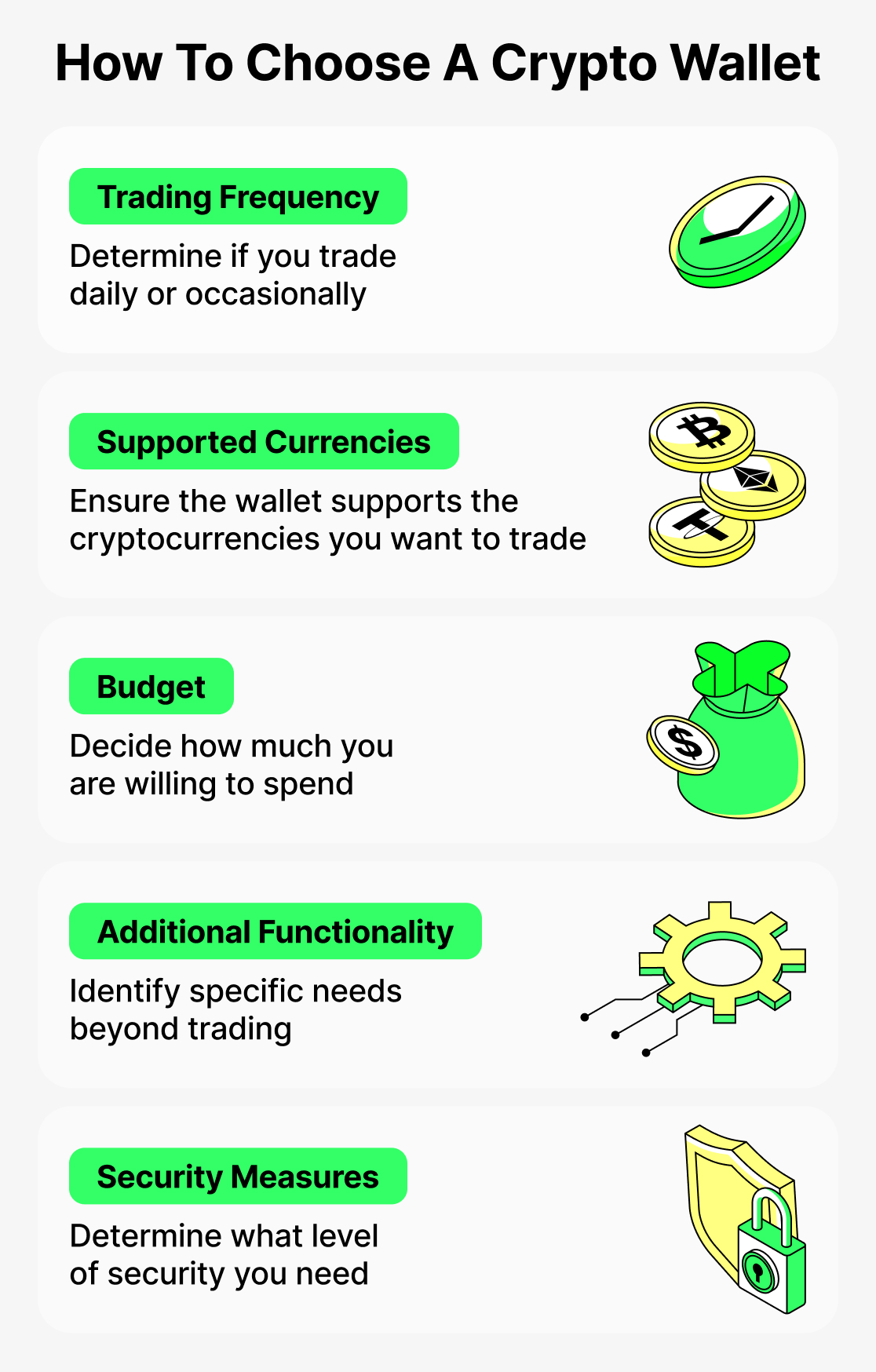
Tips for Choosing a Crypto Wallet:
- Security First: Prioritize wallets that offer top-notch security and give you complete control over your assets. Non-custodial wallets are preferred for maximum control.
- User-Friendly Interface: Opt for a wallet with an intuitive and easy-to-use interface, especially if you are new to the world of cryptocurrencies.
- Consider Your Trading Habits: If you engage in frequent trading, hot wallets like Exodus with built-in exchange options may suit your needs. For long-term holders, cold wallets like Ledger Nano X or TREZOR One provide enhanced security.
- Check Supported Cryptocurrencies: Ensure the wallet supports the specific cryptocurrencies you intend to store.
- Budget-Friendly Options: Determine your budget and find a wallet that offers the required features without breaking the bank.
- Look for Open Source Code: Consider wallets like TREZOR One that are open source, providing greater transparency and community review.
- Seek User Recommendations: Check reviews and seek recommendations from other users to assess the wallet’s reliability and customer support.
Besides security, trading frequency plays a crucial role in choosing the right wallet. If you frequently trade cryptocurrencies, hot wallets can be convenient due to their easy access and integrated exchange options. However, if you prefer long-term holding and minimal trading, cold wallets provide better protection against potential hacks.
Conclusion
In conclusion, cryptocurrency wallets play an important role in the digital economy by giving users the ability to manage and control their cryptocurrencies. They open doors to new financial opportunities and innovation, but they also require awareness and security.
The best crypto wallet FAQ
How do I backup a hardware crypto wallet?
To back up a hardware crypto wallet, a recovery mnemonic phrase is usually used. When setting up a wallet, the user is given a set of 12 or more words that should be written down and stored in a safe place. This phrase allows you to restore access to the wallet in case the device is lost or damaged.
Can I use hardware crypto wallet without Internet connection?
Yes, hardware crypto wallets can work in offline mode. They use special screens and buttons to interact with the user and sign transactions. This makes them more secure from online attacks, as private keys never leave the device.
How can you improve online crypto wallet security?
To improve online crypto wallet security, we recommend using strong passwords, enabling two-factor authentication, updating the software regularly, and monitoring for suspicious activity on your account.
Can I have multiple online crypto wallets?
Yes, you can have multiple online crypto wallets. Each wallet will have its own unique address and access details. This allows you to manage different cryptocurrencies or different accounts within the same cryptocurrency.
What are the benefits of using a mobile crypto wallet?
Mobile crypto wallets offer usability because they are available at any time and can be used to make transactions anywhere with internet access. They also usually have a simple and intuitive user interface.
Can I have multiple mobile crypto wallets on one device?
Yes, you can usually have multiple mobile crypto wallets installed on one device. Each wallet will have its own unique public and private keys, allowing you to manage different cryptocurrencies or different accounts within the same cryptocurrency.
What are the risks of using a desktop crypto wallet?
The risks of using a desktop crypto wallet include the possibility of your computer being hacked or infected with malware. There is also the risk of losing access to your wallet if your computer or wallet files get damaged or lost.
Can I have multiple desktop crypto wallets?
Yes, you can have multiple desktop crypto wallets. Each wallet will have its own unique files and access data. This allows you to manage different cryptocurrencies or different accounts within the same cryptocurrency.
How do I use a paper crypto wallet for transactions?
To use a paper crypto wallet for transactions, you need to import a private key into a wallet or program that supports that cryptocurrency. This will allow you to receive and send cryptocurrency using the address associated with the private key.
What to do if a paper crypto wallet is lost or damaged?
Losing or damaging your paper crypto wallet can cause you to lose access to your cryptocurrency funds. Therefore, it is recommended that you back up your paper wallet and keep it in a safe place. In case of loss or damage, the backup can be used to restore access.

